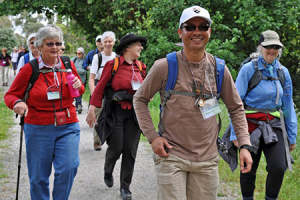We need your help... support our work
With their whole hearts, our Carmelite students dedicate themselves to serve you, your loved ones and community. Be part of their journey, support our future spiritual leaders.
Finding hope, changing lives: Anacleto’s story
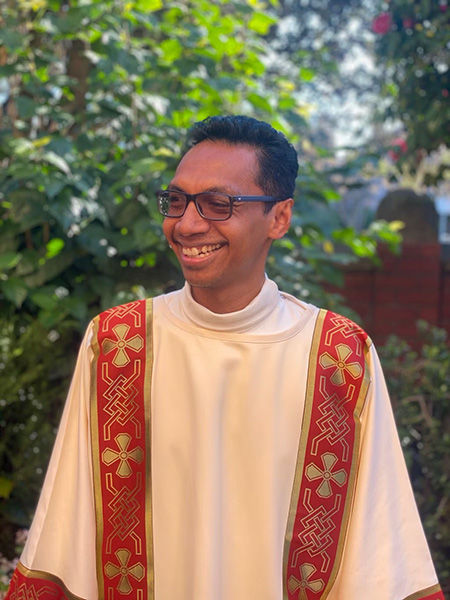 One of our Carmelite students, Anacleto Guterres da Costa, has recently been ordained as a Deacon. His journey began in heartbreak, with the loss of his family and his early years spent in an orphanage. Yet, through resilience and faith, Anacleto has defied the odds and is now well on his way to becoming a Carmelite priest.
One of our Carmelite students, Anacleto Guterres da Costa, has recently been ordained as a Deacon. His journey began in heartbreak, with the loss of his family and his early years spent in an orphanage. Yet, through resilience and faith, Anacleto has defied the odds and is now well on his way to becoming a Carmelite priest.
Reflecting on his experience, Anacleto shares:
“As I grew up, I learned to accept the reality of what happened to me, and step by step, I became aware that God has never abandoned me. In the orphanage, the Carmelite sisters loved me as if I were their son. They provided everything I needed throughout my childhood and guided me to become a good man. The Carmelites nurtured me, not just spiritually, but by their constant presence."
Thanks to the generosity of donors like you, young Timorese people like Anacleto have been given hope and a pathway to change their lives and serve their communities. Your support enables us to train the next generation of Carmelite priests, who will go on to serve in Timor-Leste, Australia, and around the world.
“My dream is to be a priest, also to be a Carmelite Priest. This is my dream. Since I was in the orphanage, although I was still young, I remember I said, 'One day I will be the Pope and my brother will be a bishop!"
Br Anacleto Guterres da Costa, O.Carm
The Carmelites - Australia and East Timor
We support people from all walks of life who have suffered both emotional and physical loss. We empower them to embrace a fulfilling life for themselves, their neighbours and their communities.
In Australia we offer programs and services which help people facing social, economic and life challenges. Through places of reflection such as the Carmelite Library, Carmelite Centre and Sancta Sophia Retreat Centre we offer people pastoral care helping to restore their faith.
In East Timor we work alongside people both in spiritual and practical ways to help overcome past hurt, restore dignity and bring them out of poverty. Through friendships formed we empower the Timorese people to rebuild their communities.
To make a donation please contact:
Fundraising Development
The Carmelites Australia & Timor-Leste
75 Wright Street, Middle Park VIC 3206
Phone:+61 3 9690 8822
E-mail: This email address is being protected from spambots. You need JavaScript enabled to view it.
Read our Privacy Statement here
Carmelite Formation Fund
Our East Timorese and Australian students are at various stages of their Carmelite education. Each student has made a deep and personal commitment to study to become a Carmelite priest or brother. With your help these Carmelite formation students will make a valuable difference to their communities and to the people of East Timor and Australia. It costs $50,000 a year to feed, clothe, house and educate a young Carmelite student in Australia.
Become an East Timor Mission Partner
You can become an East Timor Mission Partner bringing hope and freedom to the people of East Timor.
You can help transform the lives of people like Gloria, Lucinda and Sabino by providing health care, food, clothing, books and an education.
Sabino
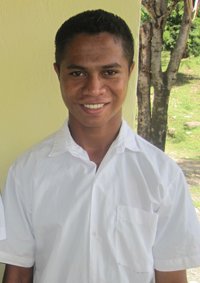 Sabino, 20, is in Year 12 at high school in Zumalai. He lives in the Carmelite boarding house – here he has a place to live and study, food to eat, school books and uniform. Sabino wants to study English and computer skills when he finishes high school.
Sabino, 20, is in Year 12 at high school in Zumalai. He lives in the Carmelite boarding house – here he has a place to live and study, food to eat, school books and uniform. Sabino wants to study English and computer skills when he finishes high school.
"The Carmelites teach us to pay attention to our studies and show us we need to be grateful for this experience by praying to God and sharing in daily prayer with the Carmelites' he says. He doesn't want to fail.
Sabino is very aware that as the oldest male in his family (his father died in 2009) he must study hard so he can get a good job to look after his mother, 10 brothers and sisters.
To make a donation please contact:
Fundraising Development
The Carmelites Australia & Timor-Leste
75 Wright Street, Middle Park VIC 3206
Phone:+61 3 9690 8822
E-mail: This email address is being protected from spambots. You need JavaScript enabled to view it.
Read our Privacy Statement here
 Remember The Carmelites in your Will
Remember The Carmelites in your Will
Leaving a Gift in your Will is a personal choice of great importance. It’s a generous gesture that will reflect your faith, beliefs and values well into the future.
By leaving a gift to The Carmelites in your Will, your legacy can create a future of possibilities. Whether it is training young men to become priests, and equipping them to become leaders of their communities, or providing young Timorese people with hope for a better future through education, your gift will sustain our work and transform lives.
To find out more about leaving a gift in your Will to The Carmelites pdf download our Gifts in Wills booklet.
You can also contact us on 03 9690 8822 or at This email address is being protected from spambots. You need JavaScript enabled to view it..
Carmelite Prayer Cards
A selection of prayer cards for different occasions is now available.
 These cards not only convey your care and concern for those in need. They also let you include those you love in the masses and prayers of the Carmelites.
These cards not only convey your care and concern for those in need. They also let you include those you love in the masses and prayers of the Carmelites.
Cards are available for:
- sympathy for those who have lost a loved one
- healing & peace for those who are ill
- spiritual support for those in physical or emotional stress
- special occasions such as birthdays and anniversaries
- prayerful wishes for any occasion
Together we can engage lives, restore people’s faith
and transform communities.
Help us bring HOPE to the lives of people who need it the most both in Australia and East Timor. Together we can engage lives, restore people’s faith and transform communities.
Help children get the best start in life.
Give HOPE to the Children of East Timor.
Together we have the opportunity to make a difference to young East Timorese children and empower them with something most of us take for granted … an EDUCATION and a chance to finally break the cycle of poverty.
With over 8,400 young people under the age of 17. In Zumalai our education programs will help stop children falling through the cracks. Your gift will give HOPE and FREEDOM to the Children of Zumalai, East Timor through these projects:
- Building three new classrooms at a village primary school to cater for increased demand.
- Erecting a new boarding house to accommodate 15-20 children from outlying villages so they can attend school.
- Providing 10 Tertiary Scholarships so young adults can attend technical college or university in Dili and Indonesia.
We need to raise $130,000 to funds these projects. Help children achieve their dreams and change the course of their lives by equipping them with a sound foundation.
To make a donation please contact:
Fundraising Development
The Carmelites Australia & Timor-Leste
75 Wright Street, Middle Park VIC 3206
Phone:+61 3 9690 8822
E-mail: This email address is being protected from spambots. You need JavaScript enabled to view it.
Read our Privacy Statement here
https://carmelites.org.au/itemlist/tag/carmelite?limit=20&start=40#sigProIdd01b1f7c3d
Latest News
Christmas prayers & greetings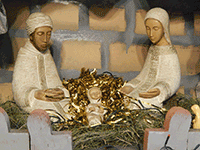
December 2014
We send our prayers and best wishes for a very happy Christmas to all the members of the Carmelite Family in Australia and Timor Leste.
As always, you will be remembered at Midnight Mass at the National Shrine of Our Lady of Mount Carmel, Middle Park, Vic.
We remember those victims of the recent tragedies in Sydney and Cairns – they and their families will be in our thoughts and prayers this Christmas, too.
Our New Novices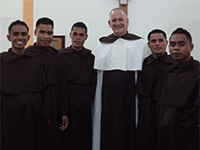
December 2014
Our new novices, Estevão Mendonça De Jesus, Luis Baptista, Francisco Xavirius Vieira Martins, Luis Mendonça Maia and Estevão De Deus Gomes were received into the Novitiate on Sunday 14 December. Fr Bruce Clark (Regional Prior & Novice Master) was the celebrant.
As well as the Carmelites present, over 120 members of the new novices' families attended. The ceremony was followed by morning tea with time for the families to see our house. After lunch there was some traditional tebe-tebe (dance). Some families came quite a distance - at least 4 hours on the back of trucks and faced the prospect of going home in heavy rain.
We warmly welcome our new brothers and congratulate them on taking this step on their Carmelite journey.
The Vine – Latest issue now available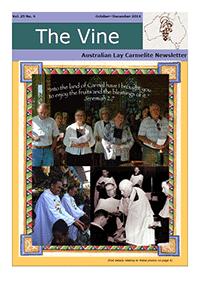
December 2014
In this issue:
• Fr Paul Gurr sees signs of growth among the Lay Carmelites
• Christine Wade reflects on Advent and the work of LCNC
• Part 1 of Sr Paula’s reflection on St Teresa of Avila
• Lay Carmelite celebrations in Rockhampton
• Keith Belton reflects on his visit to Timor Leste for the Ordinations
• 50 years of Carmel on the Central Coast
• Lay Carmelite Bookshop news
![]() The Vine 25.4 December 2014 (1.81 MB)
The Vine 25.4 December 2014 (1.81 MB)
St Teresa of Avila's Walking Staff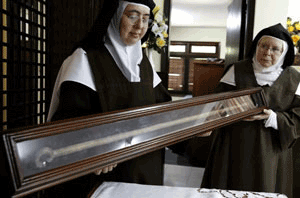
December 2014
The original walking cane used by St Teresa of Avila during her journeys across 16th Century Spain arrived at the Discalced Carmelite Friars' priory in Varroville, NSW as part of a global "Way of Light" pilgrimage to mark the 500th anniversary of her birth.
Read more ...
Magnificat newsletter - NEW!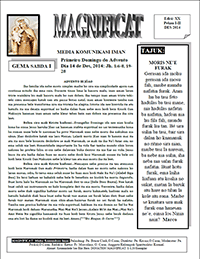
December 2014
Our young Carmelite students in Hera, Timor Leste write and publish a newsletter of Carmelite spirituality and reflection twice a month.
Under the guidance of Fr Paskalis, the 4 page newsletter features articles about Carmelite saints and topics as well as reflections on the Seasons of the Year and the Sunday Scripture. Articles are written in Tetum, Portuguese and Indonesian.
Next year we hope to be able to offer some excerpts from Magnificat in English for you.
![]() Magnificat Advent 2 2014 (775.35 kB)
Magnificat Advent 2 2014 (775.35 kB)
Carmelite Superiors meet in Vietnam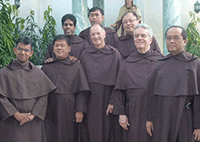
December 2014
Carmelite superiors from the Asia-Australia-Oceania region met in Ho Chi Minh City, Vietnam from 3-7 November. Present were Frs Benny Phang (General Councillor for the Region), Mario Esposito, (Provincial, St Elias) and Stephen Tuu Le (local superior, Vietnam), Ignatius Joko Purmomo (Provincial, Indonesia), Kuriakose Chandanaparambil (General Delegate India), Robert Puthussery (Provincial, India), Christian Buenafe (Provincial, Philippines), and Denis Andrew, (Provincial, Australia & Timor Leste).
There was a general sharing of information about Carmelite life in the various parts of the Region which has some 680 professed Carmelites. Among the issues discussed were the Global Plan of the General Council 2013 -2019 and mutual support for the leaders of the Region. ASOCINE will continue as a bi-monthly e-magazine of Carmelite News in the Region. Fr Benny Phang will make a fraternal visitation of the Province from 10 to 20 August 2015.
Australia's new Zimbabwean connection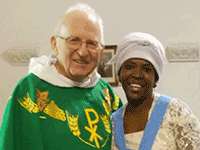
December 2014
In 1956 three Carmelites from Australia, Fr William Morganti, Fr Robert Dowd and Br George Parsons travelled to Rhodesia (now called Zimbabwe) to work with the Irish Carmelites in their mission for the next 7 years.
Our Zimbabwean connection has recently been renewed when Fr Jim Des Lauriers was asked to be Chaplain to the Zimbabwean community in Victoria.
In October 2013 Zimbabwean Catholics gathered in Perth for a congress attended by Fr Constantine Masarira, OCarm who travelled from Zimbabwe to attend.
More story & photos
JPIC Newsletter - December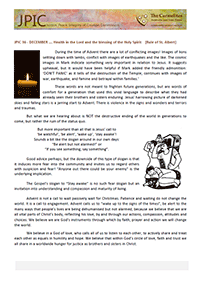
December 2014
Now available for you to download.
In this issue
- Advent reflection
- Elimination of Violence Against Women
- Intercessions
- Carmelite Tradition - the Carmelite NGO
- Blessing When the World is Ending
- JPIC Websites
![]() JPIC December 2014 (524.15 kB)
JPIC December 2014 (524.15 kB)
Lectio Divina for December - available NOW
December 2014
You can download and save the scripture texts, reflections and prayers for Lectio Divina for each day of this month by clicking the link at the end of this story. Available in pdf format or eBook (for your iPhone/iPad) or your Kindle.
Lectio Divina is a traditional way of praying the Scriptures so that the Word of God may penetrate our hearts and that we may grow in an intimate relationship with the Lord.
It is a very natural way of prayer and was developed and practised by the early monks and so came to the first Carmelite hermits. Visit our Lectio Divina page. These texts are prepared by a group of international Carmelites to help all those who use the Lectio Divina method of praying with the scriptures.
![]() Lectio Divina December 2014 PDF (871.46 kB) |
Lectio Divina December 2014 PDF (871.46 kB) | ![]() Lectio Divina December 2014 iPhone/iPad (407.12 kB) |
Lectio Divina December 2014 iPhone/iPad (407.12 kB) | ![]() Lectio Divina December 2014 Kindle (519.54 kB)
Lectio Divina December 2014 Kindle (519.54 kB)
New video from the Carmelites in Hera, Timor Leste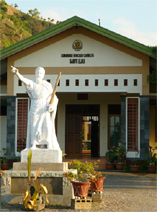
November 2014
Thanks to our young Carmelites in Hera, Fiona Matthews (Whitefriars College) and Sue Stuckey you can get a glimpse of life in the Carmelite community at Hera in a new video.
Sue also visited Timor Leste recently helping our students continue their study of English.
You can read Sue's story and watch the video here.
Carmelite Pilgrimage attracts record number of participants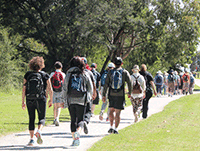
November 2014
This year's Carmelite Pilgrimage attracted 37 participants including 7 teachers from Brisbane Catholic schools.
The 40km Pilgrimage led by Fr Wayne Stanhope (Director of Formation) took place from 7-10 November in the beautiful Yarra Valley. Along with other pilgrims the Leadership Team of St Ignatius' College, Toowong, the APRE from Southern Cross College, Scarborough and a Project Office from Brisbane Catholic Education Office travelled from Melbourne to Lilydale to begin their trek to Mt Evelyn.
Read the full story and watch the video
Regional Formators meet in The Philippines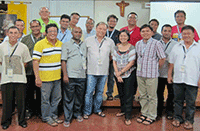
November 2014
This week Carmelite formators in our Asia-Australia-Oceania Region of the Order are meeting in Manila.
The meeting organised by the International Formation Commission is being held at the Institute of Formation for Religious Studies and includes some 15 formators of the Region (The Philippines, Vietnam, India, Indonesia, Australia, Timor Leste) including Fr Wayne Stanhope (Director of Formation, Australia and Timor Leste) and Fr Krisna Adjningraha (one of the formators in Timor Leste).
Read more
2015 Carmelite Liturgical Guide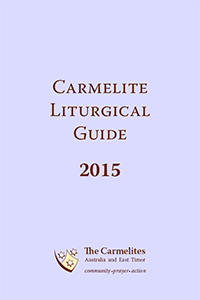
November 2015
Carmelite Communications has published the 2015 Carmelite Liturgical Guide.
The Guide lists the various Carmelite solemnities, feasts and memorials as well as the usual liturgical celebrations of the Roman Calendar. The Guide is an indispensable help to those wishing to celebrate Mass and the Prayer of the Church according to the Carmelite Calendar.
The hard copy version has been designed to fit inside the cover of your Breviary.
In the online version below you can use the "Bookmarks" to quickly choose the current month.
You can download the Guide here: ![]() 2015 Carmelite Liturgical Guide (138.13 kB)
2015 Carmelite Liturgical Guide (138.13 kB)
Benefit Concert for Timor Leste 7.30pm Saturday 15 November
7.30pm Saturday 15 November
November 2014
Whitefriars College Theatre, 156 Park Road, Donvale, Vic. Featuring Joshua Bridge, Brenna Wee, Joey Cirillo, Baily Sampson, Jareen Wee, Chelsea Elder, Cathryn Young, and Naomi Bridge. Tickets: $20, Students $15.
Come along for a wonderful night of entertainment with all proceeds going towards educations opportunities for the people of Timor Leste. For tickets contact This email address is being protected from spambots. You need JavaScript enabled to view it. on 9872 8238 or This email address is being protected from spambots. You need JavaScript enabled to view it..
Last chance for tickets in the Carmelite Raffle which will be drawn at the concert.
Win a holiday for 8 people for 4 nights at the Hunter Valley Lodge valued at $4,500 including $500 towards flights - courtesy of Helping Hand Group and Freedman & Turner Travel Associates. All proceeds to our Education=Freedom programs for East Timor.
Phone (03) 9690 8822 by Thursday for your tickets. Don't miss out!
JPIC Newsletter - November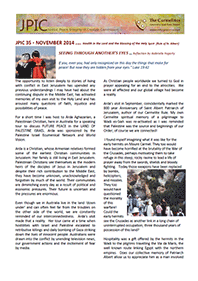
November 2014
Now available for you to download.
In this issue
- Seeing through another's eyes
- JPIC Calendar for November
- Prayerful Reflection
- Declaration of the Rights of the Child
- JPIC Websites
![]() JPIC November 2014 (979.41 kB)
JPIC November 2014 (979.41 kB)
Lectio Divina for November - available NOW
November 2014
You can download and save the scripture texts, reflections and prayers for Lectio Divina for each day of this month by clicking the link at the end of this story. Available in pdf format or eBook (for your iPhone/iPad) or your Kindle.
Lectio Divina is a traditional way of praying the Scriptures so that the Word of God may penetrate our hearts and that we may grow in an intimate relationship with the Lord.
It is a very natural way of prayer and was developed and practised by the early monks and so came to the first Carmelite hermits. Visit our Lectio Divina page. These texts are prepared by a group of international Carmelites to help all those who use the Lectio Divina method of praying with the scriptures.
![]() Lectio Divina November 2014 PDF (818.42 kB) |
Lectio Divina November 2014 PDF (818.42 kB) | ![]() Lectio Divina November 2014 iPhone/iPad (361.72 kB) |
Lectio Divina November 2014 iPhone/iPad (361.72 kB) | ![]() Lectio Divina November 2014 Kindle (404.5 kB)
Lectio Divina November 2014 Kindle (404.5 kB)
New Lay Carmelite Community Council for Coorparoo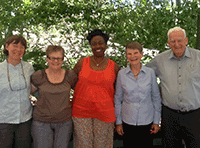
November 2014
Coorparoo Lay Carmelite Community met recently to elect a new Community Council. Members of the new Council are (left to right): Jennifer Porcellini, Joy Darby, Oby Emechite, Carmel Weston (Prior), together with Fr Matthew McPhee, OCarm., community chaplain.
Earlier in the year Ursula McNab and Joan Brady celebrated the 10th anniversary of their Final Profession as Lay Carmelites and the community gathered in September for a retreat on 'Carmelites: Mystics, Prophets and Servants' led by Fr Anthony Scerri, OCarm. About 50 people attended.
New E Bulletin for Carmelite Laity & Youth launched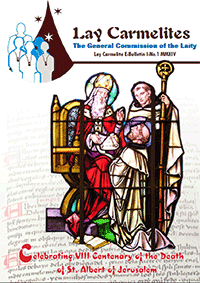
October 2014
This initiative is the result of the first meeting of the new General Commission for the Carmelite Laity and Youth of our Order. The Commission wants to strengthen spiritual formation and communications over the next 6 years. It hopes that the E Bulletin will prove to be a good way to learn more about our charism and spirituality, as well as the various projects of the laity and youth in different parts of the world.
This first issue highlights St Albert of Jerusalem and includes Lay Carmelite and Carmelite Youth news from around the world, including Australia.
Comments, suggestions and contributions for future issues are welcome. Any news regarding Lay Carmelites and Carmelite Youth, please send to This email address is being protected from spambots. You need JavaScript enabled to view it..
![]() Lay Carmelite E Bulletin No 1 2014 (808.85 kB)
Lay Carmelite E Bulletin No 1 2014 (808.85 kB)
One Page - Extra - Latest issue now available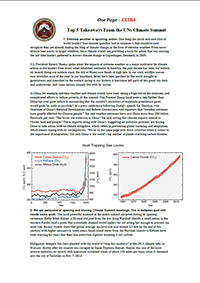
October 2014
This special issue is about the recent UN Climate Summit. Carmelite Eduardo Scarel, noted climate scientist, represented the Carmelite NGO at the Summit.
Top 5 Takeaways from the UN Climate Summit:
- Extreme weather is spurring action
- We are awesome at opening & closing Climate Summit meetings. The in-between part still needs some work
- The Green Climate Fund
- Private companies and cities are in the lead now
- We might actually keep forests around for a bit longer
![]() One Page Extra - October 2014 (194.63 kB)
One Page Extra - October 2014 (194.63 kB)
Visit our Justice, Peace & Integrity of Creation page
Ever wondered what the Carmelite NGO is?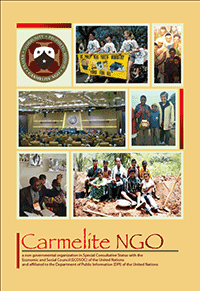
October 2014
The Carmelite NGO gives the worldwide Carmelite Family a voice in global issues at the United Nations. Founded in 2001 the Carmelite NGO assists members of the Carmelite Family in advocating on important global issues such as education, freedom of belief, human rights and sustainable development.
The goal of the Carmelite NGO is to actively participate in creating a more peaceful, just and loving world by advocating and caring for the spiritual and human needs of the human family and the environment. To accomplish this, we have chosen to actively participate at all levels of decision making-- from the individual deciding what affects him or herself and family to those decisions which affect the world. The Carmelite NGO is one means to accomplish this.
![]() CarmeliteNGO Booklet (1.57 MB)
CarmeliteNGO Booklet (1.57 MB)
Visit our Justice, Peace & Integrity of Creation page
Pope Francis on Teresa of Jesus
October 2014
In a message to Bishop Jesus Garcia Burillo of Avila Pope Francis mentions the joy the saint often spoke of “in encountering the suffering of work and pain”, and how she affirmed that “the Gospel is not a bag of lead that trails heavily behind us, but rather a source of joy that leads the heart to God and urges us to serve our brethren”.
St Teresa emphasised the importance of cheerful perseverance and prayer. For her, contemplative prayer was “a close sharing between friends; … taking time frequently to be alone with him who we know loves us”.
The Pope remarks that this advice is “perennially valid”. “Teresa of Jesus recommended three things: to love each other, to free each other, to free oneself of everything, and to aspire to true humility”.
“It is this Teresian realism”, writes the Pope, “that demands works instead of emotions, love in the place of dreams, and the realism of humble love instead of eager asceticism”. He concludes, “Let us hope that everyone may be infused by this holy impulse to travel the roads of our own time, with the Gospel in our hand and the Spirit in our heart!”.
Read the full text of Pope Francis' letter.
15 October - Feast of St Teresa of Jesus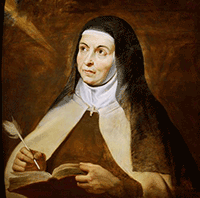
October 2014
Today is the feast day of St Teresa of Jesus (Avila). 28 March next year (2015) will be the 500th anniversary of her birth in Avila, Spain. She entered the Carmelites and made great progress in the way of perfection and was granted mystical revelations. Wishing to share in the spiritual renewal of the Church of her time, she began to live her religious life more ardently and soon attracted many companions.
Teresa also helped in the reform of the friars with Saint John of the Cross. She wrote books which are renowned for their depth of doctrine and which showed her own spiritual experiences. She died at Alba de Tormes in 1582. In 1970 Teresa was declared a Doctor of the Church by Pope Paul VI.
The Vine - Latest issue now available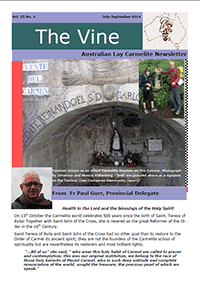
October 2014
In this issue:
- Fr Paul Gurr reflects on St Teresa of Jesus
- Christine Wade reports on the recent National Council meeting
- First meeting of the General Commission for Carmelite Laity
- Sylvia Lucas concludes her series about Lay Carmelite Life
- News from the communities
![]() The Vine 25.3 September 2014 (1.52 MB)
The Vine 25.3 September 2014 (1.52 MB)
Whitefriars College staff & students visit Timor Leste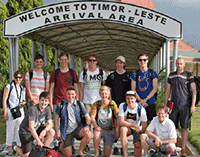
October 2014
On Monday 15 September nine Year 11 students, along with five staff members, boarded a plane for Dili, Timor-Leste for a ten day adventure.
Even though Timor-Leste is Australia’s closest foreign neighbour, the cultural change between the two countries is significant. Wide paved roads of Australia are replaced with dust covered, pot hole ridden chaos. Motor bikes are everywhere and people drive with the sound of a horn and by pushing their way into spaces that are barely apparent. Lanes are not defined nor is the flow of traffic. There are a few traffic lights now in Dili, but for the most part it is dodgem car courage as people weave their way toward their destination. One common sight is a family of four or more on one motor bike. Mum and dad will be wearing helmets to comply with the law, but none of the children will be wearing one.
Carmel Contact - latest issue now available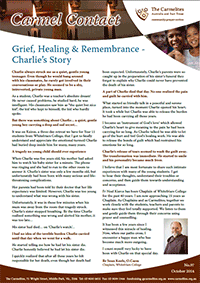
October 2014
In this issue
- Grief, Healing & Remembrance - Charlie's story
- Life's Journey through Spiritual Direction
- Fundraising for East Timor around Australia
- Ordination of Frs Angelino and Martinho
- McCorkell Constructions bring our projects to life
- Last chance for Hunter Valley Lodge raffle
- Special Gifts for Christmas
- Celebrating family, community and diversity
![]() Carmel Contact No 97 (344.78 kB)
Carmel Contact No 97 (344.78 kB)
Remembering those in God's care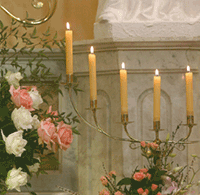
October 2014
Each year The Carmelites hold a special Mass of Remembrance as an opportunity to remember, give thanks and pray for those who are now in God’s care.
It is also an opportunity to draw strength from each other as we gently continue the journey of entrusting our loved ones into God’s care.
During the Mass you will be invited to light a candle in memory of your deceased relatives and friends and to place it near the altar.
This year's Mass will be celebrated at 6.00pm on Saturday 1 November in the National Shrine of Our Lady of Mount Carmel, Middle Park. You are warmly invited to attend.
CITOC Magazine - latest issue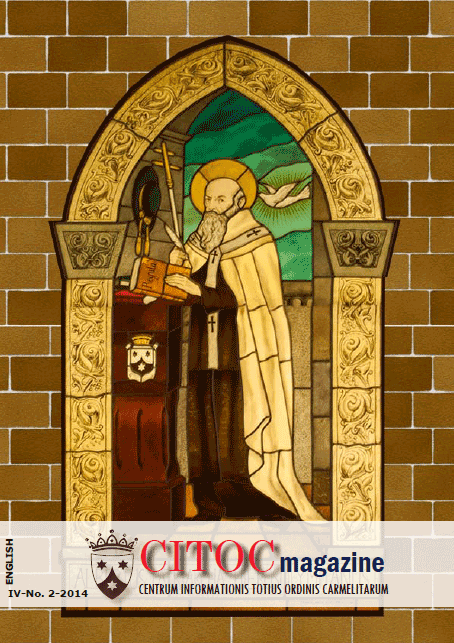
October 2014
The International Carmelite Communications Centre has published the second issue of CITOC Magazine for 2014.
In this issue
- Living the Carmelite Rule in our context
- 800th anniversary of death of St Albert of Jerusalem
- Carmelite Rule in the light of Vatican II
- 125th Anniversary of the arrival of the Carmelites in New York
- 25th Anniversary of JuCar (Carmelite Youth Movement)
- Carmelite Presence in Aragon, Castile & Valencia
- 25 years of Carmelite presence in France
- Golden Jubilee of 3rd Order in Kenya
and more. Click the link below to read more.
pdf CITOC Magazine No 2 2014 (1.57 MB)
Searching for Peace & Justice in the Holy Land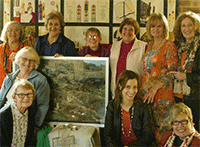
October 2014
Arda Aghazarian, a Palestinian peace activist, recently visited the Carmelite Spirituality Group at Jamberoo. In Australia at the invitation of World Vision and the Palestine Israel Ecumenical Network, Arda is an Armenian Christian living in Jerusalem.
Arda highlighted the need to avoid the 'heavy energy' which can drag believers down into a hole of literalism which creates crevasses between peoples. Click the link below to read more.
![]() Searching for Peace and Justice in the Holy Land (266.44 kB).
Searching for Peace and Justice in the Holy Land (266.44 kB).
Generals call for action to save Wadi es-Siah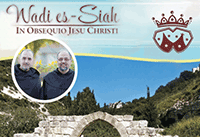
October 2014
Prior General, Fr Fernando Millán Romeral and Superior General, Fr Saverio Cannistrà have launched an appeal to raise funds for the restoration and maintenance of the ruins of the original monastery on Mount Carmel.
The Generals have called for a collection on 12 October in all Carmelite places to coincide with celebrations in Rome marking the 8th centenary of the death of St Albert of Jerusalem.
Visit www.wadi.info for more information and photos of the ruins.
![]() 2014 Letter of Generals about Ancient Carmelite Ruins (55.01 kB)
2014 Letter of Generals about Ancient Carmelite Ruins (55.01 kB)
![]() Wadi Fundraising Poster (325.19 kB)
Wadi Fundraising Poster (325.19 kB)
1 Page - Newsletter of the Carmelite NGO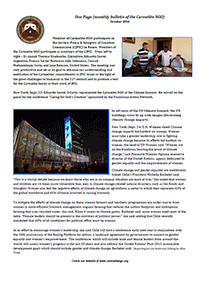
October 2014
The latest Carmelite NGO newsletter is now available.
In this issue:
- First meeting of International Carmelite JPIC Commission
- Eduardo Scarel represents Carmelite NGO at Climate Summit
- Role of Women in fighting Climate Change
![]() One Page October 2014 (413.87 kB)
One Page October 2014 (413.87 kB)
Feast of St Thérèse of Lisieux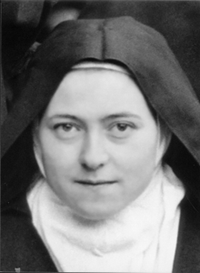
October 2014
October 1 is the feast day of St Thérèse of Lisieux. Popularly known as the "Little Flower", Thérèse Martin was born in 1873 in Alencon, France. At just 16 years old she entered the Discalced Carmelite Convent in Lisieux. Her sisters, Pauline and Marie also joined the Carmel at Lisieux.
Therese's autobiography, "Story of a Soul" contains her teaching on the 'way of confidence and love' which had great influence on the Church. Pope John Paul II proclaimed her a Doctor of the Church in 1997.
You can read more about St Therese and watch a short video here.
New priests celebrate Mass of Thanksgiving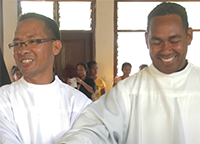
October 2014
Following their Ordination as priests on 30 August in Los Palos, East Timor, Fr Angelino and Fr Martinho each celebrated a Mass of Thanksgiving in their home villages.
Both Masses were celebrated with the customary colour and cultural elements common to celebrations in Timor Leste, and, of course, huge numbers of people attending and taking part.
Click here to view photos from the Masses of Thanksgiving.
New Chalice for Timor Leste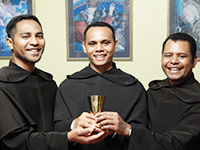
October 2014
The Little Flower Society of UK has donated a chalice to the Carmelite Mission in East Timor.
The Society recently sent out a mailing with small pieces of pewter attached to the letter. People were asked to return the small piece of pewter with their donation and then a chalice would be made from the pieces. This chalice would be used in one of the Carmelite missions around the world.
It was decided that the chalice should be used in the Carmelite Mission of East Timor and the chalice arrived in Australia in September on its way to East Timor. The chalice has the emblem of the Society of the Little Flower engraved on the front.
Picture shows East Timorese Carmelite students Agedo Bento, Januario Pinto and Martinho Lemos with the chalice which will be taken to East Timor in November.
More Ordination photos now available
October 2014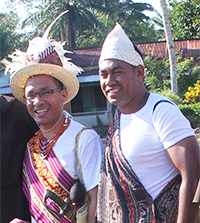
Fr Angelino Dos Santos and Fr Martinho Da Costa were ordained on 30 August in Los Palos, East Timor, by Bishop Basilio do Nascimento.
More photos from the colourful, outdoor Ordination Mass are now available for you to view.
Click here to see more photos from the Ordination of Angelino and Martinho.
Lectio Divina for October - available NOW
October 2014
You can download and save the scripture texts, reflections and prayers for Lectio Divina for each day of this month by clicking the link at the end of this story. Available in pdf format or eBook (for your iPhone/iPad) or your Kindle.
Lectio Divina is a traditional way of praying the Scriptures so that the Word of God may penetrate our hearts and that we may grow in an intimate relationship with the Lord.
It is a very natural way of prayer and was developed and practised by the early monks and so came to the first Carmelite hermits. Visit our Lectio Divina page. These texts are prepared by a group of international Carmelites to help all those who use the Lectio Divina method of praying with the scriptures.
![]() Lectio Divina October 2014 PDF (816.07 kB)|
Lectio Divina October 2014 PDF (816.07 kB)|![]() Lectio Divina October 2014 iPhone/iPad (326.98 kB) |
Lectio Divina October 2014 iPhone/iPad (326.98 kB) | ![]() Lectio Divina October 2014 Kindle (362.67 kB)
Lectio Divina October 2014 Kindle (362.67 kB)
Gerald O'Collins at The Carmelite Centre Melbourne - 7 October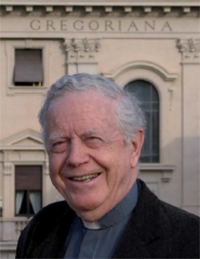
September 2014
Acclaimed theologian, biographer and autobiographer, Fr Gerald O'Collins SJ will give the 4th Carmelite Library Lecture for 2014 on Autobiography and Christianity.
Writing biographies has been a Christian activity since the beginning; witness the four Gospels. But what prompted greater and lesser Christian figures into writing autobiographies? Is producing an autobiography a worthy spiritual project?
![]() Gerald OCollins Library Lecture 2014 (54.2 kB)
Gerald OCollins Library Lecture 2014 (54.2 kB)
Tuesday 7 October 7.00-9.00pm at The Carmelite Centre 214 Richardson Street, Middle Park 3206.
More information & bookings: (03) 9690 5430 | This email address is being protected from spambots. You need JavaScript enabled to view it. | www.thecarmelitecentremelbourne.org
Catholic Media publish Ordination reports
September 2014
Pathways, the newsletter of Catholic Religious Australia, and Kairos News Service of Melbourne Archdiocese have published reports of the Ordination of Fr Angelino Dos Santos and Fr Martinho da Costa.
You can see the reports by clicking the links below.
Dempsey & Butler - Prominent Australian Catholics
September 2014
Lay Carmelites James Dempsey and John Butler have been accepted into Australia's Catholic 'Hall of Fame', Prominent Australian Catholics.
Appearing on the catholicaustralia.com.au website, Prominent Australian Catholics is a list of Catholics who have made significant contribution to Australian life. John Dempsey's name links to the Lay Carmelites in Botany Bay page on this website.
For the ten years between 1810 and 1820 Dempsey was virtually the centre of Catholic life in the colony. It was at his house that the Eucharist remained after the brief ministry of Fr Jeremiah O'Flynn in 1817.
Feast of St Albert of Jerusalem - 17 September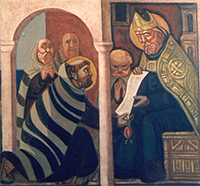 September 2014
September 2014
Albert was born in Emilia, Italy in the mid 12th century. He became a Canon Regular of the Holy Cross at Mortara (Pavia) where he was elected Prior in 1180. He was appointed Bishop of Bobbio in 1184 and of Vercelli the following year.
In 1205 he was elected Patriarch of Jerusalem and soon after nominated as papal legate for the ecclesiastical province of Jerusalem. He arrived in Palestine early in 1206, taking up residence at Acre, at the foot of Mount Carmel, as Jerusalem was occupied by the Saracens.
Sometime between 1206 and his death in 1214 Albert was approached by the Latin hermits on Mount Carmel for a 'formula of life' which later became the Carmelite Rule.
Teresa of Jesus: Listening to her story
September 2014 
In following the progress of her life, her journey of transformation, we come to know the woman whose life inspires and encourages us on our journey.
Join our Spiritual Reading Group for this session about Teresa's life and journey of transformation lead by Adrian Jones.
![]() Teresa of Jesus: Listening to her story (67.21 kB)
Teresa of Jesus: Listening to her story (67.21 kB)
Tuesday 16 September 4.30-6.00pm at The Carmelite Library 214 Richardson Street, Middle Park 3206.
More information & bookings: (03) 9690 5430 | This email address is being protected from spambots. You need JavaScript enabled to view it. | www.thecarmelitecentremelbourne.org
Carmelite Way Pilgrimage Information Evening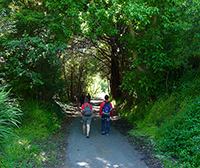 September 2014
September 2014
The annual Carmelite Way Pilgrimage will be held from Friday 7 to Sunday 9 November this year.
The Pilgrimage provides a uniquely Australian sacred experience of prayer and reflection through the Yarra Valley.
Join us at The Carmelite Centre for the Information Evening for all pilgrims
Wednesday 17 September 7.00-8.30pm at The Carmelite Centre, 214 Richardson Street, Middle Park 3206.
More information & bookings: (03) 9690 5430 | This email address is being protected from spambots. You need JavaScript enabled to view it. | www.thecarmelitecentremelbourne.org
5th Centenary of St Teresa of Jesus
September 2014
On 28 March 2015 we will celebrate the 500th anniversary of the birth of St Teresa of Jesus in Avila, Spain. The Carmelites of Australia and East Timor are developing a program of events throughout 2014 and 2015 to mark this important occasion.
You will see a logo like this on all events which are part of the Centenary program.
A First for Newly Ordained East Timorese Carmelites
September 2014
When Fr Angelino and Fr Martinho were ordained on 30 August in Los Palos, East Timor, they became the first East Timorese Carmelites to have done their entire Carmelite formation and preparation for priesthood after East Timor became part of the Australian Province in 2001.
They are also the first East Timorese Carmelites to complete their Carmelite formation and ministerial training in Australia. For the last 4 years they have been studying at ACU Melbourne, Yarra Theological Union, Box Hill and Melbourne University of Divinity.
Click here for more about the Ordination and photos.
Congratulations Angelino and Martinho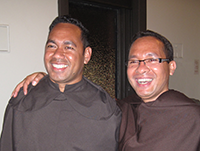
September 2014
Congratulations to our new priests: Fr Angelino Dos Santos and Fr Martinho Da Costa who were ordained yesterday by Bishop Basilio do Nascimento Martins in St Paul's Church, Los Palos, East Timor.
The ceremony was attend by some 5,000 people including 4 Carmelites from Australia: Fr Denis Andrew (Prior Provincial), Fr Bruce Clark (Regional Prior), Fr Wayne Stanhope (Director of Formation) and Fr James Des Lauriers (Prior of Middle Park Community).
More photos soon.
Lectio Divina for September - available NOW
September 2014
You can download and save the scripture texts, reflections and prayers for Lectio Divina for each day of this month by clicking the link at the end of this story. Available in pdf format or eBook (for your iPhone/iPad) or your Kindle.
Lectio Divina is a traditional way of praying the Scriptures so that the Word of God may penetrate our hearts and that we may grow in an intimate relationship with the Lord.
It is a very natural way of prayer and was developed and practised by the early monks and so came to the first Carmelite hermits. Visit our Lectio Divina page. These texts are prepared by a group of international Carmelites to help all those who use the Lectio Divina method of praying with the scriptures.
![]() Lectio Divina September 2014 PDF (717.55 kB) |
Lectio Divina September 2014 PDF (717.55 kB) | ![]() Lectio Divina September 2014 iPhone/iPad (367.01 kB) |
Lectio Divina September 2014 iPhone/iPad (367.01 kB) | ![]() Lectio Divina September 2014 Kindle (378.37 kB)
Lectio Divina September 2014 Kindle (378.37 kB)
Lay Carmelites - a growing family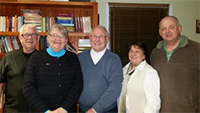
September 2014
Four Lay Carmelites from Wentworthville, Rockhampton and Central Coast communities are preparing to make their Solemn Profession this year. Melbourne community will receive three new members later this year and four more people are enquiring about becoming 'distant' members of the Lay Carmelites.
The Lay Carmelite National Council met on 22-24 August at the Benedictine Abbey, Jamberoo, to discuss the latest developments, focussing on formation for those just beginning their journey into Carmel.
During the meeting Fr Paul Gurr (Provincial Delegate for the Lay Carmelites) and Christine Wade (Moderator) reported on their visits to Rockhampton, New Zealand, Toowoomba, Adelaide, Central Coast and Wentworthville communities. Fr Paul and Fr Denis (Provincial) have also visited the ‘scattered’ Carmelites in Perth.
Coming up in September: Fr Anthony Scerri OCarm will join the Coorparoo Community for its retreat and Fr Paul and Christine will lead a retreat for the Melbourne Community. Fr Paul will also be visiting the Coorparoo community in October.
The LCNCA will meet again on 7-9 November.
JPIC Newsletter - September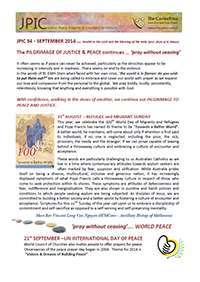
September 2014
Now available for you to download.
In this issue:
- Pilgrimage of Justice & Peace continues
- Refugee & Migrant Sunday
- International Day of Peace
- World Week for Peace in Palestine & Israel
- Reflections from Carmelite Tradition
Iconography and Prayer![]()
Discover a renewed appreciation of Iconography, an ancient art form used to help people pray and highlight spiritual qualities. The icon promotes a spiritual link between the human and divine. Today there is a resurgence of interest in Iconography – discover the reasons!
Join us at The Carmelite Centre as Sr Maria Moravski discusses this ancient art form which leads to prayer.
![]() Iconography and Prayer (59.98 kB)
Iconography and Prayer (59.98 kB)
Tuesday 9 September 7.00-9.00pm at The Carmelite Centre, 214 Richardson Street, Middle Park 3206. Cost: $25.00.
More information & bookings: (03) 9690 5430 | This email address is being protected from spambots. You need JavaScript enabled to view it. | www.thecarmelitecentremelbourne.org
College Students Raise $35,000 for East Timor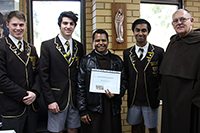
Students from Whitefriars College, Donvale (Vic) raised just on $35,000 to support the ministry of the Carmelites in East Timor. this year's Walk for Timor Leste also symbolises the College's growing link with the Timorese people and the Carmelite presence there.
College Captains Jared, Adrian and Dillon presented the cheque to Br Martinho Lemos, one of the East Timorese Carmelites studying in Melbourne. Also present was Fr Wayne Stanhope (Director of Formation).
Perth Lay Carmelites keep charism alive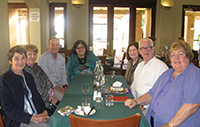
Carmelites join Prayer for Peace in Gaza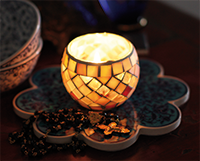
The Carmelites are joining with people throughout the world to pray for peace in Gaza.
(National Coalition of Christian Organizations in Palestine, July 2014)
Carmelites Launch Social media
The Carmelites of Australia and East Timor launched their social media presence on the Feast of St Mary of the Cross MacKillop, 8 August.
Our social media channels will be used to share our spirituality, news and information, to invite people into an experience of the Carmelite Way and to walk with them on their journey through life.
Our initial tweet anouncing our presence on social media has already been retweeted to 13,303 people.
Find us on Facebook. Follow us on Twitter.
East Timor Carmelites make Vows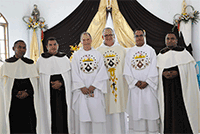
On 19 July Brs Calisto Cab Sila, Carlito Da Costa Araujo and Fausto Tilman De Araujo made their Solemn Profession (life-long commitment) as Carmelites during Mass at St Joseph's Church, Hera, East Timor.
During the same ceremony our 6 second year Novices made their initial commitment ....
Coorparoo Parish Raises funds for Timor Leste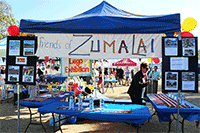
The Friends of Zumalai group in Our Lady of Mt Carmel Parish, Coorparoo (QLD), raised $662.00 selling bottled water at the Parish Primary School Community Fete.
The Fete, held on Sunday 3 August, attracts a large number of people and the warm weather helped the sales of water.
In addition to water the stall also sold $375 worth of tickets in the Carmelite Raffle raising money for the Carmelites' Education=Freedom program for the children of Zumalai Parish in East Timor.
Carmelites join Walk for Timor Leste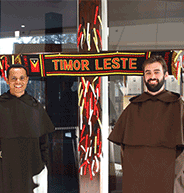
Br Januario Pinto and Br Matthew Tonini attended Mass on 18 July at Whitefriars College as part of the College's week-long celebration of the Feast of Our Lady of Mount Carmel.
Following the mass they joined Whitefriars College students in the annual Walk for Timor Leste to raise funds for the Carmelites' work in East Timor.
So far this year's Walk for Timor Leste has raised: $32,305.15.
JPIC Newsletter - August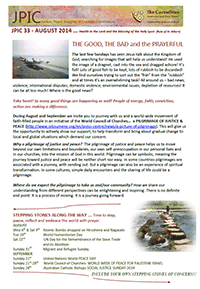
In this issue:
The good, the bad and the prayerful
August & September: Pilgrimage of Justice and peace
Our Carmelite Tradition & contemplative prayer
Embracing the world in contemplative prayer can take many forms
Young Carmelites renew their Vows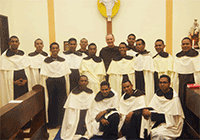
During July 18 young Carmelites in East Timor and Australia renewed their profession of vows for another year.
In East Timor 15 brothers made their renewal during Evening Prayer at the Carmelite Community in Hera (Dili) to Fr Denis Andrew (Prior Provincial).
In Australia Br Agedo Bento renewed his profession during Sunday Mass in the Carmelite parish of Our Lady of Mount Carmel, Coorparoo, QLD.
Brs J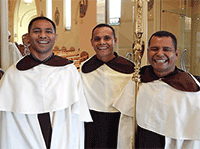 anuario Pinto and Martinho Lemos renewed their profession during Evening Prayer in the Carmelite Priory at Middle Park, Vic.
anuario Pinto and Martinho Lemos renewed their profession during Evening Prayer in the Carmelite Priory at Middle Park, Vic.
All these brothers are continuing their Carmelite formation and preparation for ministry in the Church.
We rejoice that these young men have decided to continue on the Carmelite Way and we are encouraged by their faith and commitment.
Carmelite Global Plan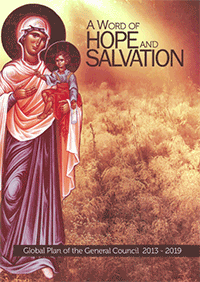
The General Council of the Carmelites has issued a global plan for the next six years.
Using the theme of the 2013 General Chapter, the General Council has called the plan, 'A Word of Hope and Salvation'.
"We live at a particular time in history when the Church is calling us anew to evangelisation… we wish to accept the challenges before us, offering to the world we live in “a word of hope and salvation”, the Council said.
Plans are offered for each of the geographical regions of the order: Africa, The Americas, Asia-Australia-Oceania and Europe. They are also offered for areas of special responsibility, including Communication, Evangelisation and Mission, Liturgy and Prayer, Finance, Formation, Justice, Peace and the Integrity of Creation, Laity, Carmelite Schools, Nuns and Sisters and for the revision of the 1995 Constitutions of the Order.
Lectio Divina for August
You can download and save the scripture texts, reflections and prayers for Lectio Divina for each day of this month by clicking the link at the end of this story. Available in pdf format or eBook (for your iPhone/iPad) or your Kindle.
Lectio Divina is a traditional way of praying the Scriptures so that the Word of God may penetrate our hearts and that we may grow in an intimate relationship with the Lord.
It is a very natural way of prayer and was developed and practised by the early monks and so came to the first Carmelite hermits. Visit our Lectio Divina page. These texts are prepared by a group of international Carmelites to help all those who use the Lectio Divina method of praying with the scriptures.
![]() Lectio Divina August 2014 PDF (780.32 kB) |
Lectio Divina August 2014 PDF (780.32 kB) | ![]() Lectio Divina August 2014 iPhone/iPad (415.58 kB) |
Lectio Divina August 2014 iPhone/iPad (415.58 kB) | ![]() Lectio Divina August 2014 Kindle (434.82 kB)
Lectio Divina August 2014 Kindle (434.82 kB)
Happy Feast Day - 16 July, Feast of Our lady of Mount Carmel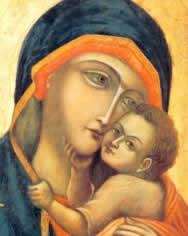
We wish all the members of our Carmelite Family a Happy Feast Day as we celebrate the Solemnity of Our Lady of Mount Carmel.
The early Carmelites on Mount Carmel dedicated their chapel to the memory of "St Mary" and claimed her as their own by adding "of Mount Carmel". They took her as their patroness, promising her their faithful service and expecting her protection and favour. They were proud to call themselves "Brothers of Saint Mary of Mount Carmel".
Following this ancient tradition, next Saturday Brs Carlito da Costa Araujo, Calisto Cab Sila and Fausto Tilman de Arajuo will make their Solemn Profession of Vows in Hera, Timor Leste. During the same mass Silveste Alves, Anacleto Guterres Da Costa, Jose Natalina Freitas, Frangelino Isaias Ximenes, Agustinho Da Conceicao Lobato Lourdes and Filomena Proto Oliveira Guterres will make their First Profession of Vows.
We hold them in our thoughts and prayers.
Coorparoo Parish celebrates Bl Peter To Rot with Papua New Guinea Catholic Community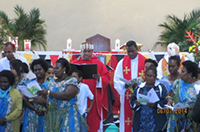
More than 80 members of the Papua New Guinea Catholic Community in Brisbane joined the Carmelite Parish of Coorparoo to celebrate the feast of Blessed Peter To Rot, the first Melanesian martyr to be beatified.
Members of the PNG Community led the music with traditional processions at the beginning of Mass, the Gospel and the Preparation of the Gifts. After mass the parish joined the community for light refreshments.
"Everyone left the church with a smile on their face," said Fr Paul Sireh (Parish Priest). he also said that the feast day would be celebrated every year in the parish with the PNG community.
Born around 1912, Blessed Peter To Rot was enrolled in 1930 at St Paul's College, Taliligap, which was founded by the Missionaries of the Sacred Heart for the formation of lay catechists. Three years later he was appointed catechist to the parish of Rakunai.
Read more about the life of Blessed Peter To Rot and see more pictures from the mass.
Lay Carmelite at Bishops' Conference
Chris Wade, Australian Lay Carmelite Moderator, attended the Australian Catholic Bishops' Conference annual national meeting of Catholic Lay Movements on 8 July at the Mary MacKillop Centre, North Sydney.
"I was keen to attend and meet other people involved in church life", Chris said, "however, my main motivation was to raise awareness of the Lay Carmelites and what we can contribute to the life of the church in Australia in the 21st century."
Each group gave a two minute thumbnail sketch of their group. These quick presentations were recorded for the Bishops’ further consideration. Bishop Peter Comensoli, Auxiliary Bishop in the Sydney Archdiocese attended, representing the Bishops Commission for Church Ministry.
"In my thumbnail presentation, I offered the Carmelite Way of contemplation based on prayer, community and service and emphasised stillness and silence as an antidote to the craziness of life in Australia today. In conclusion I quoted Ernest E Larkin OCarm, 'The goal of the Carmelite Order [is] to live continuously in the loving presence of God.'"
Shared Music brings healing and peace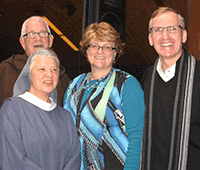
About 150 people gathered in the Albion Park Church, Wollongong, in response to the news that their local parish priest, Fr David Caterrall (40) has cancer.
David had asked Fr Paul Gurr OCarm and Sr Magdalen osb, along with local musician, Jen Charadia, to provide an evening of music for parishioners of his parish.
"I believe that shared musical experience is a healing and effective way for people to deal with the things they find difficult to grasp and manage," Fr Paul said.
This was certainly true at Albion Park where, together with their parish priest, David, the people laughed and cried, danced and sang along and strengthened their sense of family as they come to terms with Fr David’s illness.
We hold Fr David and his parishioners in our thoughts and prayers.
Poems of Doubt & Faith - from Tennyson & Arnold to Eliot
Join our spiritual reading group in the friendly atmosphere of the Carmelite Library. Max Richards will lead this session looking at Faith and Doubt in the poetry of Tennyson Arnold, Emily Dickinson, Hopkins, Hardy and Eliot.
![]() Poems of Faith And Doubt (142.5 kB)
Poems of Faith And Doubt (142.5 kB)
Tuesday 15 July 4.30-6.00pm at The Carmelite Centre, 214 Richardson Street, Middle Park 3206.
More information & bookings: (03) 9690 5430 | This email address is being protected from spambots. You need JavaScript enabled to view it. | www.thecarmelitecentremelbourne.org
Poetry for the Soul: Australian Spirituality
Looking at poems of great spiritual depth by Australian Poets: Les Murray, Kevin Hart, Francis Webb, Judith Wright, Rosemary Dobson—and many others.
Using these examples, Tony Kelly CSsR reflects on questions like: How can poetry refresh language? How does it refine our sensitivities to the whole range of reality? What is the spiritual and even Christian significance of poetry?
![]() Poetry for the Soul: Australian Spirituality (68.37 kB)
Poetry for the Soul: Australian Spirituality (68.37 kB)
Tuesday 22 July 6.30-8.30pm at The Carmelite Centre, 214 Richardson Street, Middle Park 3206.
More information & bookings: (03) 9690 5430 | This email address is being protected from spambots. You need JavaScript enabled to view it. | www.thecarmelitecentremelbourne.org
First Meeting of the General Commission for Carmelite Laity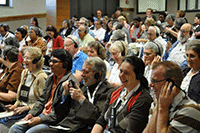
From 25 to 30 June 2014, Fr Désiré Unen, O.Carm. (Ita-Congo), Fr Joseph Hung, O.Carm. (SEL-Vietnam), Jennifer Wanjiku (Kenya), Normita Lacanilao (Philippines), José Araujo Filho (Brazil), Michele Bonanno (Italy), Juan Luis Laghi (Young People in Perú), María José García de la Barrera (Young People in Spain), gathered in Rome for the first meeting on the new Commission for Carmelite Laity under the leadership of Fr Raúl Maraví, O.Carm., Councillor General and President of this commission.
For five days the group worked on the content of the global plan for laity for the next 6 years and how to put it into effect. Each member was given an opportunity to talk about the experience of the situation of the laity and of young people in the different places where the Order is working, and the needs that exist in those places.
This work led the commission to form two sub-commissions, one for formation and the other for communication for the purpose of responding to the concerns and expectations of lay people on the international level.
It was also decided that an International Congress for Lay Carmelites be organised, to take place one year before the next General Chapter, as well as a series of other assemblies at a regional level. One of the objectives of the commission is to give more visibility and training to lay people who are part of the great Carmelite Family.
The Carmelite Laity in the Middle Ages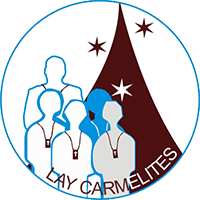
The foundation of the Mendicant Orders in the Middle Ages had a profound influence on the faithful — at that time the old monastic spirit flourished in the very midst of the people. Hence in this truly religious age, there were many who were attracted by the fervour of the Mendicants and wished to live according to the spirit of such Orders. But not all could embrace the religious life and indeed not all desired to do so.
The urgent need was a form of life which would enable the faithful to live in the world according to the spirit of religious life. Thus, the various religious, their own souls burning with love of God and love for their Orders, and anxious, too, that the devout faithful should also burn with the same love, organized a movement known as the Third Order.
Read more of this article by Australian Carmelite Fr James Pilkington, OCarm. (d. 1994)
Novena of Our Lady of Mount Carmel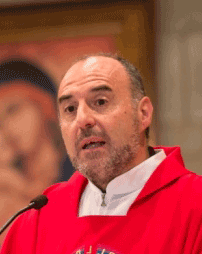
As the Feast of Our Lady of Mount Carmel is approaching, the Prior General has written a letter to the Carmelite family expressing his best wishes and inviting all members to celebrate the Feast, beginning with the Novena for the Feast of Our Lady of Mount Carmel from 7 to 15 of July 2014.
This custom of the Novena of Our Lady of Mount Carmel before the feast is a long tradition and is observed by many Catholics throughout the world.
In his letter the Prior General invites us to be united in contemplating, sharing, increasing the beauty which is all around us (even, if at times, somewhat hidden) because Carmel has been closely linked to beauty.
“My desire is that our lives should be a song of praise to God for the beauty that surrounds us, and also a generous commitment to ensure that beauty will not be diminished or tarnished by what is evil, by sin, by the suffering of so many innocent people, who are the victims of selfishness and all its ramifications, (injustice, violence, inequality .....).”
The Feast of Our Lady of Mount Carmel will be celebrated with a special Mothers' Mass at 10.30am on Sunday 20 July at the National Shrine of Our Lady of Mount Carmel, Middle Park.
Resources for National Aboriginal & Torres Strait Islander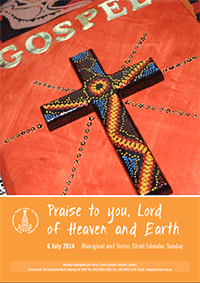
Sunday- 6 July
Visit our Justice, Peace and Integrity of Creation page to download resources for preparing for and celebrating NATSIC Sunday.
Resources include: Liturgy preparation, reflections, homily notes; activities for children and young people; prayer suggestions; personal stories; statistics and clip art.
Links to multimedia resources are also included.
The material is produced by the National Aboriginal & Torres Strait Islander Catholic Council.
![]() NATSICC Sunday Resources 2014 (1.71 MB)
NATSICC Sunday Resources 2014 (1.71 MB)
Also on our JPIC page
- Pope Francis on the Care of Creation -
 Creation 2014 (291.64 kB)
Creation 2014 (291.64 kB)
- Pope Francis on the Redistribution of Wealth -
 Wealth 2014 (132.17 kB)
Wealth 2014 (132.17 kB)
Farewell Angelino and Martinho
Our deacons, Angelino Dos Santos and Martinho Da Costa, were farewelled in a number of celebrations over the last weekend as they prepare to return to East Timor prior to their Ordination on 30 August.
Fellow East Timorese students gathered at the Carmelite Priory at Middle Park on Saturday 28 June for a BBQ lunch.
Parishioners of Port Melbourne/Middle Park Parish gathered at the 10.30am Mass on Sunday 29 to thank Angelino and Martinho for their ministry in the parish. Mass was followed by morning tea and the opportunity for parishioners to say their personal farewells. After Mass 15 Carmelites gathered at Middle Park Priory for a farewell lunch.
We wish Angelino and Martinho well as they return home to East Timor to continue their preparation for Ordination.
JPIC Newsletter - July 2014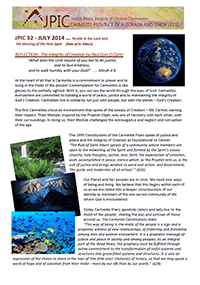
The June issue of our Justice, Peace & Integrity of Creation newsletter is now available for download.
In this issue:
- The Integrity of Creation - a reflection by Paul Gurr, OCarm
- July JPIC Calendar
- Good websites to visit
Visit our JPIC webpage for more including
- Pope Francis on the Care of Creation
 Creation 2014 (291.64 kB)
Creation 2014 (291.64 kB)
- National Aboriginal & Torres Strait Islander Sunday 2014
 NATSICC Sunday 2014 (1.71 MB)
NATSICC Sunday 2014 (1.71 MB)
- Pope Francis on the redistribution of Wealth
 Wealth 2014 (132.17 kB)
Wealth 2014 (132.17 kB)
Lectio Divina for July
You can download and save the scripture texts, reflections and prayers for Lectio Divina for each day of this month by clicking the link at the end of this story. Available in pdf format or eBook (for your iPhone/iPad) or your Kindle.
Lectio Divina is a traditional way of praying the Scriptures so that the Word of God may penetrate our hearts and that we may grow in an intimate relationship with the Lord.
It is a very natural way of prayer and was developed and practised by the early monks and so came to the first Carmelite hermits. Visit our Lectio Divina page. These texts are prepared by a group of international Carmelites to help all those who use the Lectio Divina method of praying with the scriptures.
![]() Lectio Divina July 2014 pdf (822.66 kB) |
Lectio Divina July 2014 pdf (822.66 kB) | ![]() Lectio Divina July 2014 iPhone/iPad (397.91 kB) |
Lectio Divina July 2014 iPhone/iPad (397.91 kB) | ![]() Lectio Divina July 2014 Kindle (411.78 kB)
Lectio Divina July 2014 Kindle (411.78 kB)
Matthew makes his First Profession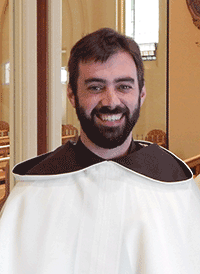 as a Carmelite
as a Carmelite
Br Matthew Tonini made his first profession of vows as a Carmelite on Sunday 22 June.
Matthew recently returned to Australia after completing his Novitiate at Brandsma Priory, Middletown, NY, USA.
Surrounded by his family, Carmelites from Australia and Timor Leste and parishioners Matthew made his profession during mass at the National Shrine of Our Lady of Mount Carmel.
Matthew, the eldest of 8 children, is a qualified teacher and holds an honours degree in Science.
The Vine - latest issue now available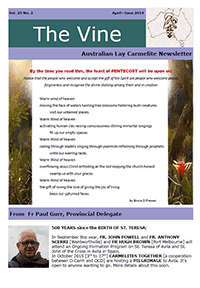
In this issue
- Pentecost Litany
- 5th Centenary of birth of St Teresa of Jesus (Avila)
- Meeting of new National Council
- Fr Paul and Chris Wade visit communities
- Local community news
- Living the charism & Mission of Carmel Today
- Jamberoo Community marches for peace
![]() The Vine 25.2 June 2014 (1.92 MB)
The Vine 25.2 June 2014 (1.92 MB)
New Lay Carmelite National Council meets
The new Lay Carmelite National Council of Australia met on the weekend of 2 – 4 May at the Benedictine Abbey, Jamberoo, amidst quiet solitude bedecked with stunningly beautiful Autumn leaves.
Council members are: Fr Paul Gurr (Provincial Delegate), Chris Wade (Moderator), Angela Zakarias (Secretary), Norm Harding (formator) and Ben Bekema (Treasurer).
During the meeting plans were made for visits to the New Zealand, Rockhampton, Wentworthville, Towoomba, Jamberoo and Adelaide.
Carmel Contact - latest issue now available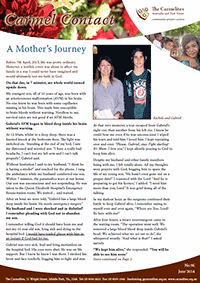
In this issue
- Rachele's Story - A Mother's Journey
- St Therese of Lisieux: An ordinary Saint
- Nine Days of Prayer for those in need
- message from the Prior Provincial
- Educating young Carmelites
- The Carmelites' Hunter Valley Raffle Prize
- East Timor Concerts
![]() Carmel Contact No 96 (819.68 kB)
Carmel Contact No 96 (819.68 kB)
Our new Deacons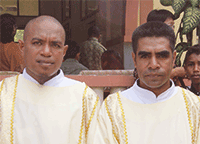
We warmly congratulate our new Deacons, Br Roque Soares Da Cruz and Br Carlito Da Silva on their ordination as Deacons on Pentecost Sunday, 8 June. The ceremony took place at the Diocesan Seminary Chapel at Nita on the island of Flores (Indonesia) where Roque and Carlito are completing their ministerial studies.
Carmel flourishes in Vietnam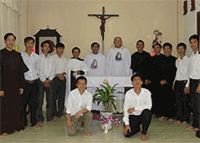
Fr Wayne Stanhope (Director of Formation) recently led a retreat for Br Paul and Br Francis, two young Carmelites preparing for Solemn Profession in Vietnam. The 30 day retreat was an immersion in the richness of the Carmelite Tradition. Paul and Francis will make their Solemn Profession in November this year.
There are 3 communities of Carmelites in Vietnam: Mount Carmel, where 6 brothers in First Profession live; St Therese, where 10 candidates for the Order live; and St Joseph's, the Pastoral house where 3 priests who minister to the people live.
Another 23 young men are in Vocational Accompaniment discerning their call to the Carmelite Way.
New pre-novices for the Province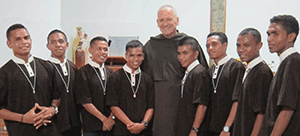
During Evening Prayer at Fatuhada community (Dili) on 4 May we formally welcomed into the pre-Novitiate 8 new candidates: Jacob Pereira dos Santos, Caitano Soares Da Silva, Jacob Dos Reis Carvalho, Francisco Soares Borges, Paulo Martins de Araújo, Jerónimo Nunes, Henrique da Conceicão and João Fernando Cabal.
All the Carmelites from Hera community were present as were some of the Hermanas Carmelitas sisters. Evening Prayer was followed by dinner and dancing. We wish these candidates a long and fruitful journey in Carmel.
Corsini House shows 'Faith in Action'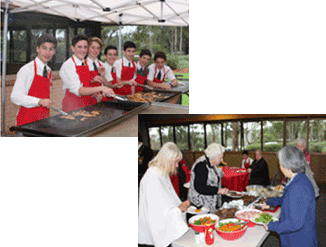
Corsini House at Whitefriars College has built a strong partnership with its charity, Doncare over the past 2 years. As well as providing financial support, more importantly we encourage students to show ‘Faith in Action’.
“On Tuesday, 27 May the Year 8s and Year 9s from Corsini 3 prepared a lunch for the elderly residents of Donvale. The event was a great
success as we prepared some delicious meals which were much appreciated by all the Doncare staff and guests that attended the event.
This was once again a great opportunity to help people who might not have otherwise had the chance to interact with us the younger
generation and this opportunity was much appreciated by all the boys.” Nick Dunmill (Year 9 C3)
St Teresa Centenary Pilgrimage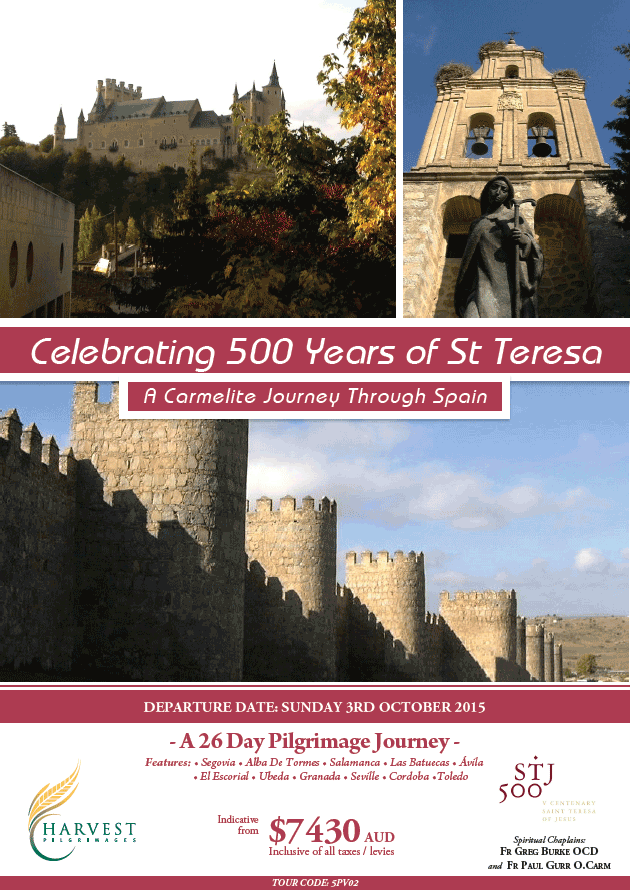
2015 marks the 500th anniversary of the birth of St Teresa of Jesus (Avila).
A special pilgrimage has been organised by Carmelites Together, an association of all the branches of the Carmelite Family in Australia.
Led by Fr Greg Burke OCD and Fr Paul Gurr OCarm this 26 day Carmelite journey through Spain will take you to Sergovia, Alba De Tormes, Salamanca, Las Batuecas, Avila, El Escorial, Ubeda, Granada, Seville, Cordoba and Toledo.
Bookings are now open for the pilgrimage which departs on Sunday 3 October 2015.
Click below to view the pilgrimage brochure and booking form.
![]() St Teresa Pilgrimage Brochure (1.99 MB) |
St Teresa Pilgrimage Brochure (1.99 MB) | ![]() St Teresa Pilgrimage Booking Form (214.56 kB)
St Teresa Pilgrimage Booking Form (214.56 kB)
Meeting of the International Formation Commission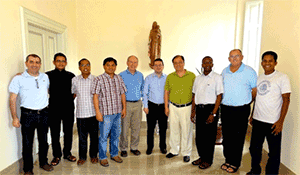
Members of the International Formation Commission met in Rome from 19 to 24 May 2014.
Those who attended were, Onesmus Muthoka (Ken), Krispinus Ginting (Indo), Jose Alex Valavanattu (Ind), Desiderio García (Arag), Wayne Stanhope (Aust), Noel Rosas (Phil), Quinn Conners (PCM), Albeiro Luis Romero (Ita-Col) and Giampiero Molinari (Ita), Benny Phang, General Councillor for Formation and Noel Rosas, Executive Secretary for Formation.
Among the items discussed were
- the main issues discussed by the International Formation Commission of the previous six years (2007-2013)
- the proposals approved at the General Chapter of 2013 in relation to formation (Secretary for formation and protocols for creating safe spaces for children and adults)
- the general plan of formation for the six years, 2013-19
- the 2013 RIVC, with a strategy for making known and having it studied throughout the Order
- suggestions for the revision of the Constitutions dealing with formation (Nos. 117-173)
- courses for the training of formation directors
- regional and international meetings for students, formation directors and ongoing formation
- the Ratio Studiorum
- translation of materials for the organization of the month of preparation for solemn profession
- revision of the Rite of Solemn Profession.
Compassion in the Workplace
The practice of compassion is understood to be as important for health as physical exercise and healthy diet. Major universities around the world are now investigating and proving the importance of compassion, contemplation and meditation. In this forum, specific research outcomes from Stanford University and the Oxford Mindfulness Centre will be presented. This workshop is an exciting opportunity to not only hear about this research but more importantly to engage us in building a compassionate presence individually and in the workplace.
This event is hosted by the School of Prayer, a program of the Melbourne Archbishop’s Office for Evangelisation. The School of Prayer aims to provide information and resources promoting new and creative forms of meditative prayer suited to contemporary needs. Damien Peile from The Carmelite Centre Melbourne has contributed to planning this workshop.
Dr Lynne Reeder and Rev Dr John Dupuche will lead this session.
Thursday 19 June 9.30am-2.30pm at Thomas Carr Centre, East Melbourne.
![]() Compassion in the Workplace (363.49 kB)
Compassion in the Workplace (363.49 kB)
Lectio Divina for June
You can download and save the scripture texts, reflections and prayers for Lectio Divina for each day of this month by clicking the link at the end of this story. Available in pdf format or eBook (for your iPhone/iPad) or your Kindle.
Lectio Divina is a traditional way of praying the Scriptures so that the Word of God may penetrate our hearts and that we may grow in an intimate relationship with the Lord.
It is a very natural way of prayer and was developed and practised by the early monks and so came to the first Carmelite hermits. Visit our Lectio Divina page. These texts are prepared by a group of international Carmelites to help all those who use the Lectio Divina method of praying with the scriptures.
![]() Lectio Divina June 2014 pdf (880.5 kB) |
Lectio Divina June 2014 pdf (880.5 kB) | ![]() Lectio Divina June 2014 iPhone/iPad (515.71 kB) |
Lectio Divina June 2014 iPhone/iPad (515.71 kB) | ![]() Lectio Divina June 2014 Kindle (493.8 kB)
Lectio Divina June 2014 Kindle (493.8 kB)
Dante's Comedy in Images
The Spirituality of the Poem though the eyes of 20th century artists.
Join us at the Carmelite Centre for an exploration of the types of punishment in the Inferno, modes of penitence in the Purgatorio and varieties of spirituality in the Paradiso through text and images.
William Johnston, international historian and lecturer, will lead this fascinating session using several dozen 20th Century paintings relevant to specific scenes in Dante's Divine Comedy.
Tuesday 10 June from 7.00pm to 9.00pm at The Carmelite Centre, 214 Richardson Street, Middle Park 3206.
![]() Dantes Comedy in Images (93.51 kB)
Dantes Comedy in Images (93.51 kB)
More information & bookings: (03) 9690 5430 | This email address is being protected from spambots. You need JavaScript enabled to view it. | www.thecarmelitecentremelbourne.org
JPIC Newsletter - June 2014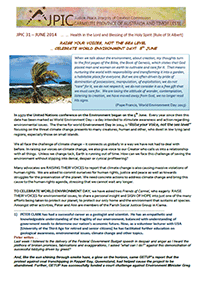
The June issue of our Justice, Peace & Integrity of Creation newsletter is now available for download.
In this issue:
- Raise your voices, not the sea level! World Environment Day 5 June
- June JPIC Calendar
- Good website to visit
- Justice for East Timor - maritime boundaries
- Prayerful Reflection
- Environmental Prayer
Visit our JPIC webpage for more
Our growing Carmelite Family
Over the next few months there will be quite a number of celebrations for our Carmelite Family.
The Provincial Council has announced the date for the Ordination to the Priesthood of Angelino Dos Santos and Martinho Da Costa which will take place on 30 August in Lospalos, Timor Leste.
Roque Soares da Cruz and Carlito da Silva are preparing for their ordination to the Diaconate in Flores on Pentecost Sunday, 8 June.
Matthew Tonini will make his First Profession of vows as a Carmelite on 22 June during Mass at 10.30am at the National Shrine of Our Lady of Mount Carmel, Middle Park, Victoria.
Carlito da Costa Araujo, Calisto Cab Sila and Fausto Tilman de Arajuo will make their Solemn Profession of Vows on 19 July in Hera, Timor Leste. During the same mass Silveste Alves, Anacleto Guterres Da Costa, Jose Natalina Freitas, Frangelino Isaias Ximenes, Agustinho Da Conceicao Lobato Lourdes and Filomena Proto Oliveira Guterres will make their First Profession of Vows.
Following these celebrations there will be 34 Solemnly Professed friars, 28 friars in First Profession, 3 Novices and 13 pre-novices in the Carmelite Province of Australia and Timor Leste.
We offer our prayer and congratulations to all these brothers marking significant steps on their Carmelite journey.
New on our Justice, Peace & Integrity of Creation page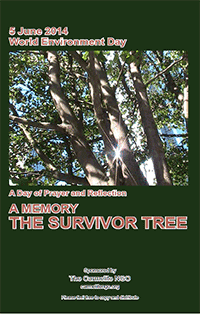
Take a look at our JPIC page where you'll find resources and articles on current Justice & Peace issues.
Recently added:
-
Prayers and Reflections for World Environment Day - 5 June 2014
-
Australian Catholic Bishops speak out for Asylum Seekers
-
Let's be good neighbours with Timor (Frank Brennan SJ)
-
The Spiritual Pathway to a Sustainable Environment (Eduardo Agosta Scarel, OCarm)
-
May Newsletter from our JPIC Commission
-
May Newsletter from the Carmelite NGO
Whitefriars Social Justice Focus
Whitefriars College students Chris Gozali, Hugh Vezey, Charles Dalziel and Michael Stringer (Social Justice Captain) attended the 2014 St Vincent De Paul College Conference recently.
During the conference each had the opportunity to take part in different sessions. Chris attended the session about the StVdP Soup Vans in Melbourne. "Soup vans are not just about the food, they are all about homeless people and their need for love."
At the session on homelessness Hugh learnt "that HOMElessness is not simply ROOFlessness. Homelessness refers to everyone that doesn’t have a place that they can feel safe in, have personal privacy in and a caring environment to live in".
Charles had the opportunity to learn about the homeless community in Melbourne. He discovered that they "are like a family, that they are extremely respectful of one another and that volunteering can be very personally rewarding and give you a feeling that is indescribable".
Michael learnt about "about society’s misconceptions about people that live on the dole and how a variety of different people end up on welfare. In fact, Australians on the dole are classified as living below the poverty line".
Michael said that "The Conference highlighted the variety of opportunities that we have to become more involved in helping those less fortunate than ourselves and we look forward to putting what we learnt into practice."
Carmelites contribute to YTU soccer win!
Brothers Angelino Dos Santos, Martinho Da Costa, Januario Pinto, Martinho Da Cruz Lemos and Agedo Bento were part of the winning Yarra Theological Union Soccer Team in the annual Brotherhood Cup held on 17 May.
Redemptorist, Divine Word Missionaries and Carmelite students made up the winning team. The opposing team was made up of Salesian, Dominican, Corpus Christi, Jesuit and MGL students.
The match was held at Salesian College, Chadstone, Victoria.
1 Page - Newsletter of the Carmelite NGO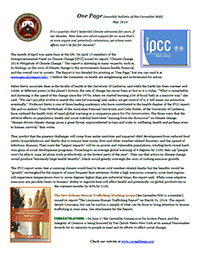
The latest Carmelite NGO newsletter is now available.
This issue deals with the 2014 report of the Intergovernmental Panel on Climate Change and the implications of global warming for food production, the healthy development of children, weather-related disasters and the spread of infectious diseases.
Also in this issue is information about a report on human trafficking in the state of Louisiana, USA.
On 1 June the Carmelite Commission for Justice, Peace, and the Integrity of Creation will be honoured by Pax Christi Metro New York at its annual Peacemaker Awards for its ministry to people in need and its efforts to effect social change.
Mass of Healing and Anointing 24 May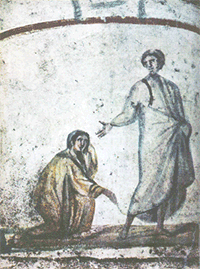
You are warmly welcome to join us for our Mass of Healing and Anointing on Saturday 24 May at 6.00pm at the National Shrine of Our Lady of Mount Carmel, Middle Park. This Mass is offered for all those in need of healing and peace in body, mind or spirit.
During the Mass everyone will be invited to receive the Sacrament of Anointing - a rite of anointing with Holy Oil and prayer for recovery.
“I was touched by your gentle Healing Mass, by the sense of peace and calm, by the tender touch of the priest as he anointed my forehead and hands – it was like God was actually touching me.”
You can send us the names of people you would like prayed for during the Mass of Healing and Anointing.
Further Information: (03) 9690 8822
Pathways Towards Meditation
For thousands of years meditation has been recognised for its remarkable benefits for body, mind and spirit. Join Meme McDonald for a nourishing day exploring techniques which will help you craft your own personal space and time for meditation.
Saturday 24 May 2014 10.00am-3.00pm at The Carmelite Centre, 214 Richardson Street, Middle Park 3206.
![]() Pathways Towards Meditation (47.63 kB)
Pathways Towards Meditation (47.63 kB)
More information & bookings: (03) 9690 5430 | This email address is being protected from spambots. You need JavaScript enabled to view it. | www.thecarmelitecentremelbourne.org
The Vine - Latest issue now available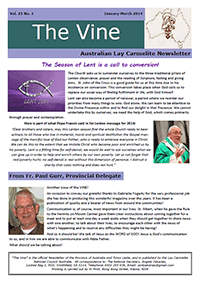
The Vine, the quarterly publication of the Australian Lay Carmelites is now available.
In this issue:
- Living the Charism and Mission of Carmel Today
- My Personal Lay Carmelite Journey
- New General Delegate for Carmelite Laity
- New in our Bookshop
- News from Communities
![]() The Vine 25.1 March 2014 (2.35 MB)
The Vine 25.1 March 2014 (2.35 MB)
Tips for Living Well: Learnings from Classical Psychology
Michael McGartland, Principal Clinical Psychologist at Alfred Health, and Anne Booth, Clinical Child Psychologist, explore the relationship of some classical studies in psychology with our experiences in everyday life.
Some questions which will be discussed are: How much are we influenced by our environment? What have we learnt from studies of infant-parent interactions? Is the child the parent of the adult? and How is it that good people can do bad things?
You are welcome to join us.
Wednesday 21 May 7.00pm-9.00pm at The Carmelite Centre 214 Richardson Street, Middle Park 3206
![]() Tips for Living Well (48.79 kB)
Tips for Living Well (48.79 kB)
More information & bookings: (03) 9690 5430 | This email address is being protected from spambots. You need JavaScript enabled to view it. | www.thecarmelitecentremelbourne.org
Roses for Mothers' Day
At Mount Carmel Parish, Coorparoo (Qld) parishioners are being invited to donate a rose bush in celebration and memory of mothers. Fr Paul Sireh OCarm (Parish Priest) says that a new garden bed has been prepared on the left-hand side of the driveway entrance to the Church. It will become a permanent memorial of thanksgiving for mothers.
Mothers' Day Roses are on sale at Mount Carmel Parish, Wentworthville (NSW). The roses will be placed around the altar on Mothers' Day. A Mothers' Day Card will be sent to each mother for whom as rose is bought. For those mothers who have died, the card will be placed with the rose at the altar. All proceeds will go towards the education of our young East Timorese Carmelites studying in Melbourne.
Eating Heaven - Spirituality at the Table
Join our Spiritual Reading Group at the Carmelite Centre on Tuesday 20 May 4.30pm-6.00pm as we explore Simon Carey Holt's book, Eating Heaven - Spirituality at the Table.
Sitting down at a table to eat is such a normal thing to do that we rarely ponder it beyond the simple inquiry, ‘What’s for dinner?’ Scratch a little deeper and you discover that it's something so laden with meaning and immersed in human longing and relationship that it takes on sacred dimensions. No wonder eating and drinking are mentioned so much in the Scriptures.
Simon Carey Holt is a trained chef, teacher, social researcher, minister of religion and homemaker. In this book, he draws on experience and research to explore the role of eating in our search for meaning and community. He invites us to sit at the tables of daily life – from kitchen tables to backyard barbecues, from cafe tables to the beautifully set tables of Melbourne’s finest restaurants – and consider how our life at these tables interacts with our deepest values and commitments.
More information & bookings: (03) 9690 5430 | This email address is being protected from spambots. You need JavaScript enabled to view it. | www.thecarmelitecentremelbourne.org
![]() Eating Heaven - Spirituality at the Table (52.87 kB)
Eating Heaven - Spirituality at the Table (52.87 kB)
Sancta Sophia hosts Harmony Festival Events
Fr Ken Petersen OCarm and Sr Kathleen Murphy OP will host an Inter-Faith Forum and an Inter-Faith Service as part of the 2014 Warburton Harmony Festival. The Festival, billed as "a unique celebration of belonging, hosted by a creative community in a beautiful environment", runs from 16-19 May.
The Inter-Faith Forum will be held from 2.00pm - 4.00pm and the Inter-Faith Service from 4.30pm-6.00pm on Sunday 19 May in the Mechanics Hall, Warburton. Both events will involve people from a variety of faith traditions.
British Carmelites elect new Provincial Council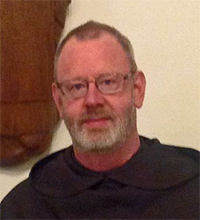
The British Carmelites gathered for their Provincial Chapter on 25-28 February and 5-9 May 2014 at Aylesford Priory, Kent.
During the Chapter a new Provincial and Council was elected:
Prior Provincial: Fr Antony Lester (pictured)
First Councillor: Fr Kevin Melody
Second Councillor: Fr Damian Cassidy
Third Councillor: Fr Francis Kemsley
Fourth Councillor: Br Paul Jenkins
Remembering Dom Bede Griffiths
You are invited to join the Sancta Sophia Meditation Community, Warburton, to celebrate the life and message of Bede Griffiths. Embraced by Love is the theme of a day of readings, chants, meditation and the Eucharist on Saturday 10 May 10.00am to 3.00pm.
Cost: $30.00. Please bring some lunch to share.
Bookings: (03) 5966 2120.
Whitefriars College Remembers ANZACs
Mark Angelovski, Lachlan Mahon and Jack Schroder represented Whitefriars College at the Anzac Day ceremony held in Templestowe Park on Thursday 24 April.
The Ceremony was attended by hundreds of students and teachers from schools in the surrounding Manningham area as well as Members of Parliament and the Mayor of Manningham.
Each school had an opportunity to lay a wreath at the memorial.
"The ceremony gave an opportunity for students to pay their respects to soldiers who had given up their lives for our country. It was great for Whitefriars to be involved in this community event and we were glad to be there representing the College, to pay respects to
those that fought in the wars representing Australia" Whitefriars College Student, Jack Schroder said.
JPIC Newsletter - May 2014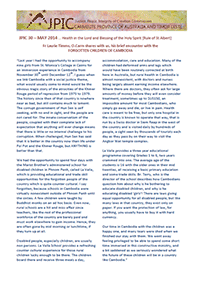
May 2014
The May issue of the Justice, Peace and Integrity of Creation Newsletter is now available.
In this issue
- Forgotten children of Cambodia
- Carmelite Tradition: Option for the Poor
- Church Tradition: Pope Francis
- JPIC Calendar for May
- Prayerful Reflections for this month
Lectio Divina - May 2014
May 2014
You can download and save the scripture texts, reflections and prayers for Lectio Divina for each day of this month by clicking the link at the end of this story. Available in pdf format or eBook (for your iPhone/iPad) or your Kindle.
Lectio Divina is a traditional way of praying the Scriptures so that the Word of God may penetrate our hearts and that we may grow in an intimate relationship with the Lord.
It is a very natural way of prayer and was developed and practised by the early monks and so came to the first Carmelite hermits. Visit our Lectio Divina page. These texts are prepared by a group of international Carmelites to help all those who use the Lectio Divina method of praying with the scriptures.
![]() Lectio Divina 2014 pdfMay (803.08 kB) |
Lectio Divina 2014 pdfMay (803.08 kB) | ![]() Lectio Divina May 2014 iPad/iPhone (376 kB)
Lectio Divina May 2014 iPad/iPhone (376 kB) ![]() Lectio Divina May 2014 Kindle (389.82 kB)
Lectio Divina May 2014 Kindle (389.82 kB)
Fr Wayne Appointed to International Commission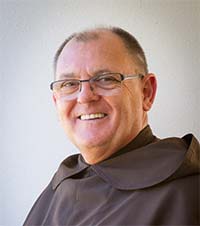
April 2014
Fr Wayne Stanhope, Director of Formation for our Province, has been appointed to the International Carmelite Formation Commission. The Commission is responsible for offering international opportunities for ongoing formation for Carmelites, courses for those involved in formation ministry and for continuously updating the Order's fundamental document on formation, the Ratio Institutionis Vitae Carmelitanae.
The latest version of the RIVC has just been published under the English title: Carmelites Formation: A Journey of Transformation (see below).
The new International Commission will hold its first meeting in Rome towards the end of May.
New Carmelite Formation Document published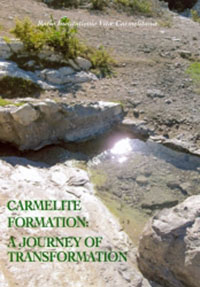
April 2014
A new edition of the Ratio Institutionis Vitae Carmelitanae, the Order's fundamental document on formation has been released.
Known as the Ratio or RIVC for short it has recently been printed in book form in English, under the title Carmelite Formation: A Journey of Transformation.
The new edition has changes suggested by Provincials and Formators across the Order. New or revised additions relate to the vows, human development, silence, liturgy, work, inculturation and child protection. These texts were presented and refined at two international gatherings of Formators and Provincials.
Announcing the release of the new Ratio, Fr Fernando Millán (Prior General) said, "formation is not only something that is academic and intellectual. It is also a question of an attitude that is both spiritual and life-oriented". Such an attitude "means to remain always attentive to the will of God and to our identity, which is fundamentally a response to that will, and to the signs of the times, through which, despite all their ambiguity, God is communicating something to us."
"I believe that we can all be enriched by reading it and we can feel challenged and encouraged in our vocation, whatever our age may be or whatever stage of formation we find ourselves in now," he said.
Catching Up - New Novices received last December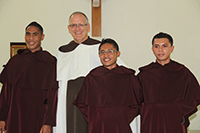
Cesaltino Dos Santos, Juliao Dos Santos and David Soares began the first year of their novitiate on 14 December 2013. Fr Bruce Clark (Regional Prior and Novice Master) formally admitted them in a ceremony at Sáo Elijah community chapel. Carmelites from Timor Leste attended the ceremony together with many family members and friends of Cesaltino, Juliao and David.
The reception of Cesaltino, Juliao and David bring the total number of novices belonging to our Province to ten.
See more photos of the Reception Ceremony.
Carmel Contact No 95 - April 2014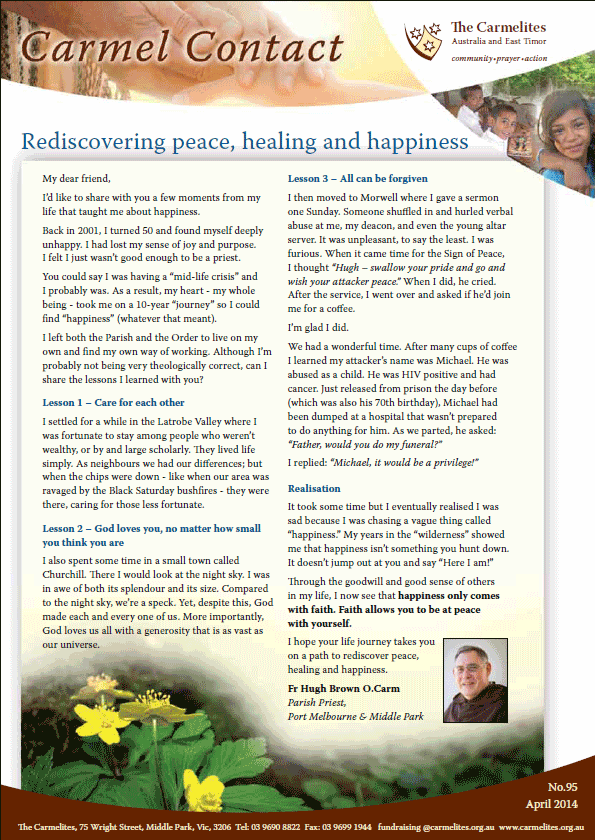
In this issue
- Rediscovering peace, healing & happiness
- Faith & Healing for all Australians
- Mass of Healing & Anointing - 24 May, National Shrine
- A Whole new world - Luke Murphy, a student at Whitefriars College,
writes about his experiences in East Timor - Mt Carmel, Coorparoo, raises $18,000 for East Timor
- Mary in the Carmelite Tradition
- Message from Fr Denis - Our Future Leaders
- Fr Peter Byrth RIP
- Your generosity raised $583,000 last year for our communities in Australia & East Timor
- Order your Carmelite Prayer Cards now
![]() Carmel Contact No 95 (795.53 kB)
Carmel Contact No 95 (795.53 kB)
JPIC Newsletter - April 2014
April 2014
The April issue of the Justice, Peace and Integrity of Creation Newsletter is now available.
Special Theme: Walking with Pope Francis on the road to Justice, Peace and Ecology
- in the words of Pope Francis:
- Inclusion Vs Exclusion
- Throwaway Society
- Poverty
- Common Good
- Women
- Gospel & Politics DO mix
- Prayerful Reflection for this month
- Prayers for passengers & crew on Flight MH307
Lectio Divina - April 2014
April 2014
You can download and save the scripture texts, reflections and prayers for Lectio Divina for each day of this month by clicking the link at the end of this story. Available in pdf format or eBook (for your iPhone/iPad) or your Kindle.
Lectio Divina is a traditional way of praying the Scriptures so that the Word of God may penetrate our hearts and that we may grow in an intimate relationship with the Lord.
It is a very natural way of prayer and was developed and practised by the early monks and so came to the first Carmelite hermits.Visit our Lectio Divina page.These texts are prepared by a group of international Carmelites to help all those who use the Lectio Divina method of praying with the scriptures.
![]() Lectio Divina April 2014 pdf (877.7 kB)
Lectio Divina April 2014 pdf (877.7 kB) ![]() Lectio Divina April 2014 iPad/Kindle (438.13 kB)
Lectio Divina April 2014 iPad/Kindle (438.13 kB) ![]() Lectio Divina April 2014 epub (416.09 kB)
Lectio Divina April 2014 epub (416.09 kB)
JPIC Newsletter - March 2014
March 2014
The March issue of the Justice, Peace and Integrity of Creation Newsletter is now available.
In this issue:
- Fr Denis looks at electoral justice in Timor Leste
- East Timor Oil & Gas dispute
- March JPIC Calendar
- Carmelite Constitutions on Justice
- Prayerful Reflections for you to use
St Nuno's Celebration moves to 6 November
Feburary 2014
The memorial of St Nuno Alvarez Periera (Carmelite and patron saint of Portugal) has been changed from 1 April to 6 November.
The previous date, normally in Lent or the Octave of Easter, meant that St Nuno's feast was not often able to be celebrated.
The online version of the 2014 Carmelite Liturgical Guide has been updated to reflect this change.
JPIC Newsletter - February 2014
February 2014
The February issue of the Justice, Peace and Integrity of Creation Newsletter is now available.
In this issue:
- Fr Laurie reports from the SHERGER Detention Centre
- February JPIC Calendar
- Carmelite Constitutions on Justice
- Prayerful Reflections for you to use
![]() JPIC February 2014 (867.13 kB)
JPIC February 2014 (867.13 kB)
2014 Carmelite Liturgical Guide
January 2014
Carmelite Communications has published the 2014 Carmelite Liturgical Guide. The Guide lists the various Carmelite solemnities, feasts and memorials as well as the usual liturgical celebrations of the Roman Calendar. The Guide is an indispensable help to those wishing to celebrate Mass and the Prayer of the Church according to the Carmelite Calendar.
In the online version below you can use the "Bookmarks" to quickly choose the current month.
Copies of the Guide can be purchased from Carmelite Communications for $5.00 plus postage.
You can download the Guide here: ![]() 2014 Carmelite Liturgical Guide (240.51 kB)
2014 Carmelite Liturgical Guide (240.51 kB)
The Vine - December 2013
December 2013
The December issue of the Vine is now available.
In this issue:
- Central Coast Community celebrates 50 years
- From Christine Wade, the new Moderator
- Thank you from Fr Jim
- New Lay Carmelite National Council
- News from communities
![]() The Vine 24.4 December 2013 (1.88 MB)
The Vine 24.4 December 2013 (1.88 MB)
Carmelites
Carmelites work with communities in Australia and Timor-Leste (East Timor) helping people to transform their lives.
Community speaks of trust and relationships with one another, and the Carmelites' commitment to strengthen and support all those who are part of our family within Australia and Timor-Leste.
Prayer speaks to the heart of what is Carmelite: our relationship with God. Through liturgy and prayer Carmelites are committed to supporting and sustaining you on your spiritual journey.
Service speaks to the Carmelite attitude of responding positively to the needs of the people we serve; empowering and accompanying them in their experiences and in their faith.
WHO ARE WE
Carmelites have a tradition spanning eight centuries originating in the 1190's in the Holy Land with the first Carmelites arriving in Australia in 1802.
Since arriving in Australia The Carmelites have been actively involved with Australian communities through parish ministry, schools, spirituality and retreat centres, and library offering pastoral and spiritual companionship to people.
Since 2001 The Carmelites have been supporting the people of Timor-Leste both spiritually and through assisting in the reconstruction of their communities. Through the friendships that have been established we aim to empower the Timorese people to rebuild their own communities and help them recover from the hurt of their painful past.
THE CARMELITES IN TIMOR-LESTE
Timor-Leste is the poorest country in the Asia Pacific region and a very close neighbour to Australia. The Timorese people have lived through traumatic experiences and our help is needed to assist them on the journey from despair to living richer fuller lives.
Our mission in Timor-Leste is to:
- Educate young men to become Carmelites and work within their communities
- Educate students, through offering scholarships and traineeships
- Train young people in skills to gain employment in industries
- Refurbish essential buildings eg; schools, youth centres
- Provide training and equipment to assist in agricultural programs
- Provide safe drinking water
- Offer Sacramental Programs for communities
- Provide pastoral and spiritual companionship for life's journey
You can help with our mission by becoming involved and helping us to give others the opportunity for a better life.
THE CARMELITES IN AUSTRALIA
In Australia Carmelites work in a variety of areas serving communities and offering their prayer and companionship
Our Ministries involve
- Running a Catholic College for boys
- Administering parishes around Australia
- Supporting lay men and women to live a reflective life
- Providing pastoral support to those suffering in our communities
- Working as chaplains in hospitals and schools to support people at their most vulnerable
- Providing a theological resource in The Carmelite Library for academics and those seeking a deeper meaning in life
- Offering courses through The Carmelite Centre which supports people in their life journey
- Spirituality and retreat centre for spiritual healing which offer a place for reflection and pastoral care
- Offering a reflective place at The National Shrine of Our Lady of Mount Carmel where people can share together through companionship and prayer
HOW THE CARMELITES CAN SUPPORT YOU
At times each one of us is challenged by the pain and hurt that our life journey brings. It is at times like this that The Carmelites offer companionship, hope and a place to share faith which can help give great strength during these difficult times.
The Carmelites offer their prayer and companionship through five special Masses celebrated throughout the year at The National Shrine of Our Lady of Mount Carmel. Each of these Masses provide opportunities for people to come together in prayer to give thanks, to pray for healing and to remember loved ones.
Carmelite Mass Celebrations
- Mothers– for all mothers living and deceased (July)
- Remembrance – for deceased relatives and friends (November)
- Christmas – for all your needs and intentions (December)
Each of these masses is open to all either by attendance or by responding with personal intentions.
Carmelite Prayer Cards
When family and friends become ill, lose their job, have a relationship break-down or suddenly find themselves alone, it is comforting to know that they have the support of their family, friends and – people like The Carmelites.
The Carmelites provide beautiful reflective prayer cards which can be sent on these occasions to assure those you care for of The Carmelites' prayers and your love and support for them. Because these cards are exclusive to The Carmelites each person who receives one will receive a beautiful unique gift and card.
We have prayer cards for
- Healing and Peace for those who are sick
- A gift of Prayer for any occasion
- Spiritual support for those going through physical or emotional struggles
- Sympathy and Mass for those recently deceased
- Special Occasion for birthdays, anniversaries and special days
pdf Carmelite Prayer Card Order Form
GET INVOLVED
The Carmelites undertake many activities which support and serve the community both in Australia and East Timor. We invite you to become involved and help us to raise awareness and funds to support these services.
Become a member of The Carmelites and receive
- Our newsletter ‘Carmel Contact' FREE
which features articles of reflection and meditation as well as updates on the life and work of The Carmelites in Australia and East Timor .
- Invitations to participate in the Masses at The National Shrine of Our Lady of Mount Carmel
- Mass cards to forward to family and friends
- Invitations to attend special gatherings and major events
Purchase goods which help us raise money for Timor-Leste
- Timorese organic coffee
- Tias [traditional woven cloth]
- Recycle bags
- Occasional cards
- Christmas cards
If you would like to join us, purchase goods or find out more, please contact:
This email address is being protected from spambots. You need JavaScript enabled to view it.
Carmelite Province Centre
75 Wright Street
Middle Park Vic 3206
Telephone: 03 9690 8822
Carmelite in Van Diemen's Land
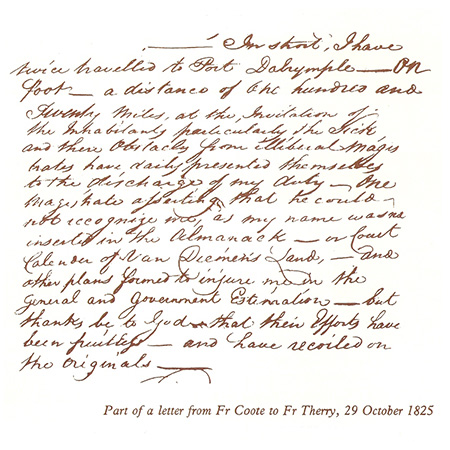 The story of Fr Samuel Coote, OCarm
The story of Fr Samuel Coote, OCarm
1824-25
In 1824 a Carmelite priest arrived in Australia. He was Fr Samuel Coote, a Kilkenny man who studied at Maynooth and was ordained in 1818. Although he was only the fourth priest to come free to work on the Australian continent, he is a little known and rather neglected figure in Australian Catholic history.
He was known to the family of Fr Therry in Cork, and it was perhaps through them that he came to be interested in the Australian mission. In September 1823 he secured official government permission to minister to Catholics in Van Diemen's Land, and sailed from Ireland in the Ardent that November, arriving in Hobart in Mary 1824. There he met with a cool reception from the resident chaplain, Fr Conolly.
It is difficult now to reconstruct exactly what happened. Although Fr Coote had letter of introduction from the British Colonial Office and from Dr Poynter, the Vicar Apostolic of London, Fr Conolly seems to have objected that he did not have the necessary faculties from Dr Slater of Mauritius, the bishop responsible for New Holland. As a return of correspondence with Mauritius could take up to two years, Conolly in the meantime gave permission for Coote to minister at some of the outlying settlements, celebrating Mass on Sundays and teaching the children catechism. Fr Coote moved about the smaller settlements, and seems to have impressed the Catholic settlers in many of them.
Fr Conolly, however, was a hard man to impress, and within a few month the two priests had fallen out: Conolly forbade Coote to exercise his ministry, and Coote sought to replace Conolly as the official Catholic chaplain. In April 1825, 169 free Catholic settlers (probably a goodly proportion of the Catholic population at the time) petitioned the Governor, expressing their satisfaction with Fr Coote's work for themselves and their children. "This rev. gentleman has officiated in several districts", they wrote, "and the conciliatory and pious manner in which he has invariably conducted himself since his arrival in this colony, his unremitting endeavours in instruction in this confined sphere of action, and his disinterested behaviour have secured for him the highest esteem." At the same time they complained of Fr Conolly's failure to complete the Hobart chapel, despite the provision of funds for the purpose.
The Governor, however, was not prepared to support Fr Coote and in December 1825 he left the colony for England, never to return. Columbus Fitzpatrick remembers that he spent some time in Sydney, but whether he had any contact with the other two Carmelites in Sydney at this time, James Dempsey and John Butler, we now have no way of knowing. He died in London of consumption on 18 September 1837, aged fifty.
Fr Paul Chandler, OCarm
Carmelite Figures
There are many famous Carmelites who have influenced generations of spiritual seekers throughout the Order's history. Here are just some of them.
 Saint Albert of Jerusalem was born in Emilia, Italy in the mid 12th Century. He became a Canon Regular of the Holy Cross at Mortara (Pavia) where he was elected Prior in 1180. He was appointed Bishop of Bobbio in 1184 and of Vercelli the following year. During his 20 years there he undertook a number of missions of national and international importance. He brokered peace between the cities of Pavia and Milan in 1194 and between the cities of Parma and Piacenza in 1199. In 1191 he held a Diocesan Synod, the statutes and decrees of which continued to serve as a norm until modern times.
Saint Albert of Jerusalem was born in Emilia, Italy in the mid 12th Century. He became a Canon Regular of the Holy Cross at Mortara (Pavia) where he was elected Prior in 1180. He was appointed Bishop of Bobbio in 1184 and of Vercelli the following year. During his 20 years there he undertook a number of missions of national and international importance. He brokered peace between the cities of Pavia and Milan in 1194 and between the cities of Parma and Piacenza in 1199. In 1191 he held a Diocesan Synod, the statutes and decrees of which continued to serve as a norm until modern times.
In 1205 he was elected Patriarch of Jerusalem and soon after nominated as papal legate for the ecclesiastical province of Jerusalem. He arrived in Palestine early in 1206, taking up residence at Acre, at the foot of Mount Carmel, as Jerusalem was occupied by the Saracens. In Palestine he continued his peace-making efforts not only between Christians but also between them and non-Christians.
On 14 September 1214 he was stabbed to death during a procession to celebrate the Feast of the Exaltation of the Cross by the Master of the Hospital of the Holy Spirit whom Albert had denounced for his unjust and abusive behaviour.
Somewhere between his arrival in Palestine in 1206 and his death in 1214 the first group of Carmelites asked Albert to write for them a "formula of life" which later became the Carmelite Rule approved by Pope Innocent VI in 1247.
 Saint Teresa of Avila, who almost single handedly reformed the order in the 16th century, was responsible for the establishment of the Discalced Carmelites in the latter part of the century. Her life was a colourful and supernatural series of events that had amazed and awed observers and followers of the order for centuries. Teresa was born in Avila in Spain in 1515. She entered the Carmelites and made great progress in the way of perfection and was granted mystical revelations. Wishing to share in the spiritual renewal of the Church of her time, she began to live her religious life more ardently and soon attracted many companions, to whom she was like a mother. She also helped in the reform of the friars with Saint John of the Cross, and in this had to endure great trials. She wrote books which are renowned for their depth of doctrine and which showed her own spiritual experiences. She died at Alba de Tormes in 1582. In 1970 Teresa was declared a Doctor of the Church by Pope Paul VI.
Saint Teresa of Avila, who almost single handedly reformed the order in the 16th century, was responsible for the establishment of the Discalced Carmelites in the latter part of the century. Her life was a colourful and supernatural series of events that had amazed and awed observers and followers of the order for centuries. Teresa was born in Avila in Spain in 1515. She entered the Carmelites and made great progress in the way of perfection and was granted mystical revelations. Wishing to share in the spiritual renewal of the Church of her time, she began to live her religious life more ardently and soon attracted many companions, to whom she was like a mother. She also helped in the reform of the friars with Saint John of the Cross, and in this had to endure great trials. She wrote books which are renowned for their depth of doctrine and which showed her own spiritual experiences. She died at Alba de Tormes in 1582. In 1970 Teresa was declared a Doctor of the Church by Pope Paul VI.
 Saint John of the Cross was born at Fontiveros in Spain about 1542. He entered the Carmelites and with the permission of his superiors began to live a stricter life. Later he was persuaded by St Teresa to begin, together with some others, a reform within the Carmelite friars which cost him much hard work and many trials. He died in Ubeda in 1591, outstanding in holiness and wisdom, to which his many spiritual writings give eloquent witness. His writings were first published in 1618. After his death the reform he introduced within the friars eventually separated from the Carmelite Order to become the Order of Discalced Carmelite Friars. John was canonised in 1726 and declared a Doctor of the Church in 1926.
Saint John of the Cross was born at Fontiveros in Spain about 1542. He entered the Carmelites and with the permission of his superiors began to live a stricter life. Later he was persuaded by St Teresa to begin, together with some others, a reform within the Carmelite friars which cost him much hard work and many trials. He died in Ubeda in 1591, outstanding in holiness and wisdom, to which his many spiritual writings give eloquent witness. His writings were first published in 1618. After his death the reform he introduced within the friars eventually separated from the Carmelite Order to become the Order of Discalced Carmelite Friars. John was canonised in 1726 and declared a Doctor of the Church in 1926.
Famous Carmelites of the 20th Century include
 Saint Therese of Lisieux, one of only four women Doctors of the Church, so named because of her famous teaching on the 'way of confidence and love' set forth in her best-selling memoir, 'Story of a Soul'. Thérèse Martin was born in Alencon in France in 1873. Whilst still young she entered the Discalced Carmel of Lisieux, where she lived - as Sister Thérèse of the Child Jesus and the Holy Face - in the greatest humility and evangelical simplicity and confidence in God. By word and example she taught the novices these same virtues.
Saint Therese of Lisieux, one of only four women Doctors of the Church, so named because of her famous teaching on the 'way of confidence and love' set forth in her best-selling memoir, 'Story of a Soul'. Thérèse Martin was born in Alencon in France in 1873. Whilst still young she entered the Discalced Carmel of Lisieux, where she lived - as Sister Thérèse of the Child Jesus and the Holy Face - in the greatest humility and evangelical simplicity and confidence in God. By word and example she taught the novices these same virtues.
Offering her life for the salvation of souls and the spread of the Church, she died on 30 September 1897. She was 24 years old. She was declared a Doctor of the Church in 1997.
 Blessed Titus Brandsma, a Dutch scholar and writer who was killed in Dachau Concentration Camp because of his stance against Nazism. Born at Bolsward (The Netherlands) in 1881, Titus joined the Carmelite Order as a young man. Ordained priest in 1905, he obtained a doctorate in philosophy in Rome. He then taught in various schools in Holland and was named professor of philosophy and of the history of mysticism in the Catholic University of Nijmegen where he also served as Rector. He was noted for his constant availability to everyone and for his concern for his students for whom he collected food, clothing and blankets.
Blessed Titus Brandsma, a Dutch scholar and writer who was killed in Dachau Concentration Camp because of his stance against Nazism. Born at Bolsward (The Netherlands) in 1881, Titus joined the Carmelite Order as a young man. Ordained priest in 1905, he obtained a doctorate in philosophy in Rome. He then taught in various schools in Holland and was named professor of philosophy and of the history of mysticism in the Catholic University of Nijmegen where he also served as Rector. He was noted for his constant availability to everyone and for his concern for his students for whom he collected food, clothing and blankets.
He was a professional journalist, and in 1935 he was appointed ecclesiastical advisor to Catholic journalists. Both before and during the Nazi occupation of The Netherlands he fought, faithful to the Gospel, against the spread of the Nazi ideology and for the freedom of Catholic Education and the Catholic Press. For this he was arrested and sent to a succession of prisons and concentration camps where he brought comfort and peace to his fellow prisoners and did good even to his tormentors. In 1942, after much suffering and many humiliations, he was killed by lethal injection at Dachau. He was beatified by John Paul II on 3 November 1985.
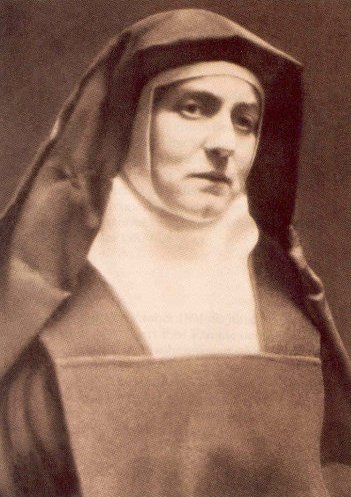 Saint Teresa Benedicta of the Cross, a Jewish convert to Catholicism who was also imprisoned and died at Auschwitz. Edith Stein was born to a Jewish family at Breslau on 12 October 1891. Through her passionate study of philosophy she searched after truth and found it in reading the autobiography of St Teresa of Jesus (Avila). In 1922 she was baptised and in 1933 she entered the Carmel of Cologne where she took the name Teresa Benedicta of the Cross. She was gassed and cremated at Auschwitz on 9 August 1942 during the Nazi persecution and died a martyr for the Christian faith after having offered her holocaust for the people of Israel. A woman of singular intelligence and learning, she left behind a body of writing notible for its doctrinal richness and profound spirituality. She was beatified by Pope John Paul II at Cologne on 1st May 1987, and canonised by him in 1998. In 1999 she was declared one of the six patron saints of Europe.
Saint Teresa Benedicta of the Cross, a Jewish convert to Catholicism who was also imprisoned and died at Auschwitz. Edith Stein was born to a Jewish family at Breslau on 12 October 1891. Through her passionate study of philosophy she searched after truth and found it in reading the autobiography of St Teresa of Jesus (Avila). In 1922 she was baptised and in 1933 she entered the Carmel of Cologne where she took the name Teresa Benedicta of the Cross. She was gassed and cremated at Auschwitz on 9 August 1942 during the Nazi persecution and died a martyr for the Christian faith after having offered her holocaust for the people of Israel. A woman of singular intelligence and learning, she left behind a body of writing notible for its doctrinal richness and profound spirituality. She was beatified by Pope John Paul II at Cologne on 1st May 1987, and canonised by him in 1998. In 1999 she was declared one of the six patron saints of Europe.
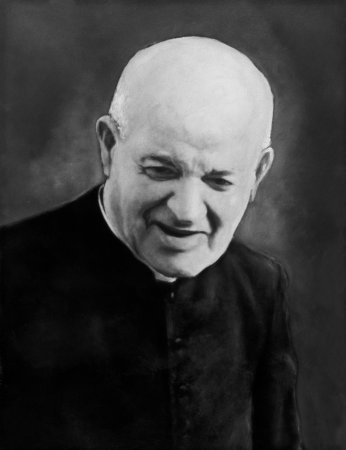 Saint George Preca was born in Valletta, Malta, on 12 February 1880. Ordained priest in 1906, he immediately began working with young people. In 1907 he founded the Society of Christian Doctrine, commonly known as M.U.S.E.U.M. (Magister Unitam Sequatur Evangelium Universus Mundus). He dedicated his life to preaching and teaching. His effective ministry was the fruit of a life of prayer and constant meditation on the Sacred Scriptures. On 21st July 1918, Fr George was received into the Carmelite Third Order and one year later, on 26th July 1919, he made his profession. In 1952 he was 'affiliated' to the Order as a recognition of his efforts to spread devotion to the Blessed Virgin Mary under the title of Our Lady of Mount Carmel. He died on 2nd July 1961 and was beatified by Pope John Paul II on 9 May 2001, and canonised by Pope Benedict XVI on 3 June 2007. His canonisation made Saint George the first member of the Carmelite Third Order to be formally recognised by the Church as a saint.
Saint George Preca was born in Valletta, Malta, on 12 February 1880. Ordained priest in 1906, he immediately began working with young people. In 1907 he founded the Society of Christian Doctrine, commonly known as M.U.S.E.U.M. (Magister Unitam Sequatur Evangelium Universus Mundus). He dedicated his life to preaching and teaching. His effective ministry was the fruit of a life of prayer and constant meditation on the Sacred Scriptures. On 21st July 1918, Fr George was received into the Carmelite Third Order and one year later, on 26th July 1919, he made his profession. In 1952 he was 'affiliated' to the Order as a recognition of his efforts to spread devotion to the Blessed Virgin Mary under the title of Our Lady of Mount Carmel. He died on 2nd July 1961 and was beatified by Pope John Paul II on 9 May 2001, and canonised by Pope Benedict XVI on 3 June 2007. His canonisation made Saint George the first member of the Carmelite Third Order to be formally recognised by the Church as a saint.
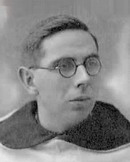 Blessed Hilary Januszewski was a Polish Carmelite born on 11 June 1907 and joined the Carmelites in September 1927. Following his studies and ordination in Rome he was appointed lecturer in Dogmatic Theology and in Church History for the students of the Polish province in Krakow. In 1939 he was appointed Prior of that community. World War II was to jeopardise all the hopes and projects of the young prior. On 1 September 1939, after several months of widespread international tension, Germany declared war on Poland. Twenty days later, Soviet troops launched an attack from the East. A year after the invasion, the invading forces ordered the arrest of large numbers of monks and priests. On 18 September five Carmelites were arrested including Fr Hilary, who offered to go instead of Fr Konoba, who was older than him and sick. In the concentration camp at Dachau he volunteered to look after prisoners suffering from typhus in the infamous Hut 25. After 21 days serving the sick, he died of typhus. Read the full story of Fr Hilary.
Blessed Hilary Januszewski was a Polish Carmelite born on 11 June 1907 and joined the Carmelites in September 1927. Following his studies and ordination in Rome he was appointed lecturer in Dogmatic Theology and in Church History for the students of the Polish province in Krakow. In 1939 he was appointed Prior of that community. World War II was to jeopardise all the hopes and projects of the young prior. On 1 September 1939, after several months of widespread international tension, Germany declared war on Poland. Twenty days later, Soviet troops launched an attack from the East. A year after the invasion, the invading forces ordered the arrest of large numbers of monks and priests. On 18 September five Carmelites were arrested including Fr Hilary, who offered to go instead of Fr Konoba, who was older than him and sick. In the concentration camp at Dachau he volunteered to look after prisoners suffering from typhus in the infamous Hut 25. After 21 days serving the sick, he died of typhus. Read the full story of Fr Hilary.
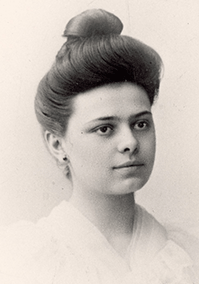 St Elizabeth of the Trinity was born on 18 July 1880. As a young child she earned a reputation as an incessant chatterbox and vivacious crawler. She was strong-willed and determined. As she grew up she became known for her generous and loveable nature. She was an excellent musician whose concerts won critical acclaim. At the same time her awareness of God began to grow. In the midst of a busy social life she managed to find time to help with troubled youth and seemed to radiate the presence of God wherever she went. She entered the Carmelite Convent at Dijon in 1901. She was given the name 'Elizabeth of the Trinity'. Here she grew in the Carmelite attributes of reflective prayer, living in the present moment, loving God wholeheartedly and serving others with simplicity. Much like St Therese of Lisieux, Elizabeth's way was one of simple conversation with God and a deep, abiding awareness of God's presence within. Read the full story of St Elizabeth of the Trinity.
St Elizabeth of the Trinity was born on 18 July 1880. As a young child she earned a reputation as an incessant chatterbox and vivacious crawler. She was strong-willed and determined. As she grew up she became known for her generous and loveable nature. She was an excellent musician whose concerts won critical acclaim. At the same time her awareness of God began to grow. In the midst of a busy social life she managed to find time to help with troubled youth and seemed to radiate the presence of God wherever she went. She entered the Carmelite Convent at Dijon in 1901. She was given the name 'Elizabeth of the Trinity'. Here she grew in the Carmelite attributes of reflective prayer, living in the present moment, loving God wholeheartedly and serving others with simplicity. Much like St Therese of Lisieux, Elizabeth's way was one of simple conversation with God and a deep, abiding awareness of God's presence within. Read the full story of St Elizabeth of the Trinity.
Spirituality Centre
The Carmelite Centre
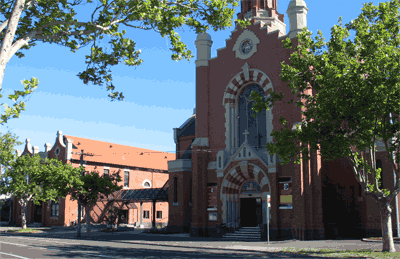
The Carmelite Centre is located at 214 Richardson Street, Middle Park, Victoria.
The Centre offers opportunities to explore
- Carmelite Spirituality
- reconciliation with different cultures
- spiritualities of world religions
- social justice
- developing your personal spirituality
- Lectio Divina
- the spirituality of Lent, Easter, Advent & Christmas
- religious art
- weekly meditation opportunities
- faith formation
- wellbeing, healing and prayer
Carmelite Centre events are held online, in the O'Connor/Pilkington Rooms (located between the Church & Hall), or the Carmelite Library (in the same building).
For full program details and more information, click here.
For further details contact: The Carmelite Centre on 9690 5430
or email us at This email address is being protected from spambots. You need JavaScript enabled to view it.
Fr Hilary Januszewski
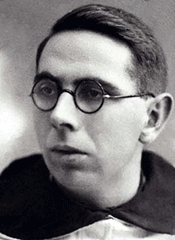 "Faithful in little, faithful in much…."
"Faithful in little, faithful in much…."
A letter by Fr Joseph Chalmers Prior General of the Carmelites on the occasion of beatification of Fr Hilary Januszewski, O.Carm.
13 June 1999
Dear brothers and sisters in Carmel,
The Holy Father, Pope John Paul II, during his next apostolic visit to Poland, will beatify 108 martyrs who were victims of the nazi persecution during World War II. Among them is our brother, Father Hilary Januszewski.
Dachau and the Carmelites
Along with some magnificent human, scientific, social and political achievements, the twentieth century, now drawing to a close, will leave us with a number of dreadful names: Auschwitz, Hiroshima, Verdun, Rwanda and others, each an example of the horror, barbarity and disregard for humankind which has also marked this century. Dachau is one of those names. It was the first concentration camp opened by the national-socialism, back in March 1933, on the premises of a former arms factory. It was also practically the last one to be freed, on 29 April 1945. The name of this noble barbarian town, near Munich, famous for its nineteenth-century school of painting and the hospitality of its people, became forever linked to the Lager (concentration camp).
On 16 July 1942 an unusual clandestine ceremony was held to celebrate the feast of Our Lady of Mount Carmel. Several Carmelites, from different parts, were imprisoned at the camp at the same time in the huts reserved for the clergy. That morning, at dawn, before setting out for their forced labour, they joined hands to celebrate with joy, despite the appalling nature of the circumstances, the fact that even there they could be and persevere sub tutela matris.
One of them was Father Titus Brandsma, a Dutch Carmelite, journalist and lecturer at the University of Nimega (of which he was Rector Magnificus), imprisoned for defending the rights of the Catholic press against the forces of domination and for trying to save a group of Jewish children. He was beatified by John Paul II in November 1985. One of his companions was Brother Raphael Tijhuis, who was with him during the last days of his life and who was the main witness of these dramatic events.[1]
Father Albert Urbanski was also there. He was a Polish Carmelite who was to write some beautiful letters to the Curia General in Rome shortly after the camp was liberated in May 1945, describing his experiences over the years in which he was deprived of his freedom and the most basic rights. He set an example by putting himself at the service of the Order right from the beginning.[2] Urbanski wrote one of the first accounts of the camp and the priests’ life there.[3] After the War, he did some marvellous work in several positions of responsibility. He was provincial from 1964 to 1967. He was the first president of the Studium Josephologiae Calissiae (under the Polish Studium Mariologiae).[4]
Several other Polish Carmelites were imprisoned at the camp. Some of them survived the hell of Dachau, although they came out of it severely marked by the experience, both physically and psychologically. Others, however, lost their lives there. Among them we find Father Leon Michail Koza, who died on the vigil of Ascension Day in 1942 through exhaustion owing to the tough labour in the fields;[5] Father Szymon Buszta, who died a few weeks after Father Koza, also as a result of physical and psychological exhaustion [6] and Father Bruno Makowski.[7] Together with them, we should mention G. Kowalski, who died in Auschwitz in November 1940, while waiting to be transferred to Dachau [8].
Father Hilary Januszewski, the one who will soon be beatified by Pope John Paul II, was also there. He is the second Carmelite of this century to be beatified, which is a source of deep satisfaction for the whole Carmelite family.
Father Hilary Januszewski
Father Januszewski was born in Krajenki on 11 June 1907. He was christened Pawel and educated in the Christian faith by his parents, Martin and Marianne. After going to school in Greblin (where the family lived from 1915), he continued his studies at the secondary school (Gimnasium) in Suchary, which he had to leave later because of financial difficulties in the family. After periods at other schools, he went to Krakow, where he did a number of courses (including correspondence courses) and joined the Order of the Our Lady of Mount Carmel in September 1927, whereupon he changed his name to Hilary. After his noviciate, he took his vows on 30 December 1928 and moved to Krakow to do his studies for the priesthood. After these studies he was sent to Rome to study at St. Albert’s International College. There he lived with Carmelites from all over the world who were concerned with how the situation in Europe was becoming increasingly complicated and how tension was rising all the time. The young Hilary proved to be a silent and prudent man, who loved studying. People could sense in him a deep inner life and a wealth of spiritual experience, as some of his colleagues, including Prior General, Father Kilian Healy [9], were to indicate later on. He was ordained on 15 July 1934. In Rome, he came into contact with a generation of Carmelites who were to mark the history of the Order during this century: Xiberta, Brenninger, Esteve, Grammatico, Driessen and others.
Upon his return to Poland, he was appointed lecturer in Dogmatic Theology and in Church History for the students of the Polish province in Krakow. In 1939 he was appointed Prior of that community by the provincial, Father Eliseo Sánchez Paredes, one of the Spanish Carmelites who had been sent to Poland to help in the restoration of this province.
World War II was to jeopardise all the hopes and projects of the young prior. On September 1, 1939, after several months of widespread international tension, Germany declared war on Poland. It was the beginning of a terrible month in the recent history of Poland. Twenty days later, Soviet troops launched an attack from the East. A weak Polish army surrendered on both fronts at the end of that month. Poland was once again humiliated and divided. Mass deportations, destruction, annihilation of Jewish communities followed in quick succession. The Polish clergy did not escape this persecution. A year after the invasion, the invading forces ordered the arrest of large numbers of monks and priests. The Carmelites in Krakow were particularly hard hit: on September 18 A. Urbanski, A. Wszelaki, M. Nowakowski and P. Majcher were all arrested, to be followed shortly afterwards by the prior of the community H. Januszewski, who offered to go instead of P. Konoba, who was older than him and sick. Father Januszewski acted heroically without stopping to consider the consequences of his action, guided by his conscience and his Christian and religious values, by what he considered to be his obligation as the head of a Carmelite community. He was arrested and, after some time at the Montelupi prison in Krakow and several concentration camps, he ended up at Dachau.
During the severe winter of 1945, news began to filter through that the German army was growing weak and that there was a possibility of retreat and even of freedom. Life at the camp had become unbearable. In addition to the normal conditions, there were constant threats of bombings and reduced rations. The kapos (prisoners in charge of working parties) were continually on edge, intensifying beatings and other forms of repression.
Hut 25 was being used to group together, in the most inhumane conditions, all the prisoners with typhus fever, who were constantly growing in number. The camp authorities offered the Polish priests the opportunity to put their "theories" of Christian charity into practice and look after the typhus patients. Freedom was by then imminent and the risk of death in the wretched hut 25 was very high. However, the silent Carmelite was one of the first volunteers.
What he said to his friend Father Bernard Czaplinski (later the Bishop of Chelm) shortly before he set off for the hut leaves one very moved even today: You know I won’t come out of there alive….[10]
Sure enough, Father Januszewski never left Dachau alive. After 21 days serving the sick, he died of typhus. Hut 25 had become a coffin, which the Americans, who freed the Lager a few days later, found crammed with hundreds of corpses.
His testimony for us today
The beatification of Father Januszewski is a source of joy and happiness for all Carmelites. The Church has considered one of our brethren an intercessor and an example, a valid witness for the universal Church. This is an occasion for Carmelites not only to feel that joy and to celebrate it, but also to reflect upon and to think deeply about Father Januszewski’s testimony, to find in his example keys to our own way of living today.
First of all, there is a good example in the biography of Father Januszewski of a selfless, quiet, silent life, founded upon deep prayer and service of others. Those who knew him insist that he was remarkably simple. Had it not been for his heroic death, he would probably have been forgotten, because he never stood out in extraordinary things.[11] But with that strength that grows from a life of prayer, acting in the presence of the Lord - something very typical and genuine in Carmelite spirituality - he gave himself up for others with the same simplicity with which he lived a quiet, hard-working life. A person educated in daily devotion generously offered his life when faced with arrest and the reality of the concentration camp. We could say that he succeeded in being faithful to his vocation in ordinary circumstances and, as a result, was also able to be just as faithful in truly extraordinary circumstances. Faithful in very little, he was faithful also in much (Lk 16, 10).
Father A. Urbanski, with whom he was joined both in religious life and in fate, writing to the Carmelite Curia in Rome from the camp during the forced quarantine following liberation, interpreted his death as follows:
Proh dolor R.P. Hilarius Januszewski, die 26.3.45, uno Mense ante liberationem, tanquam victima zelus sacerdotalis erga infectuose infirmos, mortuus est.[12]
As this century draws to a close, we are horrified by certain events that have taken place during it. We find the experience of the concentration camps in which Father Januszewski lost his life especially cruel and inhuman. However, there are situations even now that are, in a way, very similar: racial hatred, poverty and starvation, wars of all kinds, massacres, intolerant violent nationalist movements… The testimony of Father Januszewski invites the Carmelites of the twenty-first century to make a radical option for life, which nowadays is threatened in so many ways. He was able to do this in the most sublime way, giving up his own life for that of others.[13]
Father Januszewski’s example reminds us that Carmelites are called to vouch for life in the midst of a "culture of death", which shows itself in many different ways, not only in those regions of the world in which that "culture of death" is more obvious, but also in other areas where its presence is more subtle. Moreover, in the face of the temptation of "usefulness", of valuing human beings for what they produce, and eliminating those who are no longer useful and become a burden, Father Januszewski opted radically for the dying, the useless, those who apparently had nothing left to offer. With this action, he proclaimed and testified to the sacred value of human life, for itself and in itself. This witness given by Hilary Januszewski went to the ultimate limit, the giving of his own life.
We also find in Father Januszewski an especially interesting example for our experience of the Carmelite charism today. Januszewski, a man of silence and prayer, accustomed to talking to God, devoted to contemplation -like any good Carmelite - had no difficulty in finding the face of Christ in the weak, the needy and the suffering. In the awful conditions of Dachau, those with typhus fever, the dying, were the poorest of the poor and Father Januszewski, along with other priest volunteers, was willing to stay with them and end up dying with them and for them.
A life of intense prayer makes us more human and more capable of living in solidarity with others; it gives us the necessary intuition and sensitivity to discover the mysterious presence of the Lord in those who are weakest, in the midst of the tensions and contradictions of life. Like John in the boat on the Lake of Galilee, between the darkness of the passing night and the light of dawn, the Carmelite is called to proclaim, humbly but firmly: It is the Lord (Jn 21, 7).
Finally, the witness of Hilary Januszewski, soon to be called blessed must show Carmelites throughout the world the meaning of the international dimension of our Order. We must not forget that most of the patients Father Januszewski looked after were Russians (that is, from an enemy country). But this, seemingly, did not affect his decision. Overcoming national barriers, Father Januszewski offers us a true witness to universal fraternity, to reconciliation between enemy nations, and to peace.
Three years earlier, Blessed Titus Brandsma had ended a document, requested of him as part of the investigation into the opposition of Dutch Catholics to national-socialism, with the following words: God save Holland! God save Germany! Let God make these two nations walk in peace and freedom once again and recognise his Glory!
May the example and intercession of these two blessed Carmelites help us to enter the twenty-first century with a real spirit of service, peace and justice born out of a true and intense encounter with our Risen Lord.
Rome, 19 March 1999
Solemnity of St. Joseph
Fr Joseph Chalmers, O.Carm.
Prior General
Footnotes
1 R. TIJHUIS, Met Pater Titus Brandsma in Dachau: Carmelrozen 31-32 (1945/46) 18-21, 53-58, 80-85. The English translation may be consulted in: Dachau Eye-witness, in: AA.VV., Essays on Titus Brandsma [R. Valabek, ed.] (Rome 1985) 58-67.
2 F. MILLAN ROMERAL, Carmelitas en Dachau: las cartas del P. A. Urbanski, desde el lager, en el 50 aniversario de la liberación: Carmelus 42 (1995) 22-43.
3 A. URBANSKI, Duchowni w Dachau (Krakow 1945).
4 Cf. JUAN BOSCO DE JESÚS, Dos figuras de la Josefología en Polonia recientemente desaparecidas: PP. Alberto Urbanski, O.Carm. (1911-1985) y Estanislao Ruminski (1929-1984): Estudios Josefinos 40 (1986) 91-98.
5 Cf. Necrología (Obituary): Analecta O.Carm. 11 (1940-1942) 219; A. URBANSKI, Duchowni w Dachau, 61-66.
6 Cf. Necrología (Obituary): Analecta O.Carm. 12 (1943-1945) 230; A. URBANSKI, Duchowni w Dachau, 65-66.
7 Cf. Necrología (Obituary): Analecta O.Carm. 12 (1943-1945) 230; A. URBANSKI, Duchowni w Dachau, 61-66.
8 His photographs may be seen in the splendid photograph album published recently by the Carmelite Province of Poland: R. RÓG, Duch, Historia, Kultura (Krakow 1997) 68-69.
9 K. HEALY, Prophet of Fire (Rome 1990) 181-184 (Italian and Spanish versions available)
10 In the same sense, see the testimony of: F. KORSZYNSKI, Un vescovo polacco a Dachau (Brescia 1963) 125. This is the Italian translation (with a preface by the then Cardenal Montini) of Jasne promienie w Dachau (Poznan 1957).
11 Cf. K. HEALY, Prophet of fire (Rome 1990) 181-184.
12 F. MILLAN ROMERAL, Carmelitas en Dachau: las cartas del P. A. Urbanski, desde el lager, en el 50 aniversario de la liberación: Carmelus 42 (1995) 37. In another letter, written in German, he insists on this: "Als Opfer zelus sacerdotalis ist er gestorben" (ibid. 42).
13 Cf. R. VALABEK, Greater Love Than This... Father Hilary Januszewski, O. Carm.: Carmel in the World 30 (1991) 209-216.
Publications
Australian Carmelite Publications
International Carmelite Publications
Documents of the Carmelite Order
- Carmelite Constitutions
Approved by the General Chapter 1995 - Journeying With Carmel
Extracts from the Carmelite Constitutions 1995
Letters of the Prior General
- pdf Into the Land of Carmel - 25 May 2002
- The God of Our Contemplation - 1 January 2005
- pdf Passion for Christ, Passion for Humanity - 9 January 2005
- pdf That Carmel May Bloom - 27 March 2005
- The Lord Hears the Cry of the Poor - 1 March 2006
- pdf Blessed Maria Teresa Scrilli - 8 September 2006
National Shrine of Our Lady of Mt Carmel
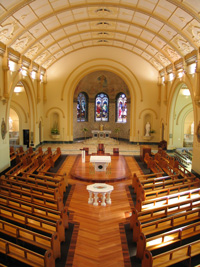 The National Shrine of Our Lady of Mount Carmel is located at the corner of Richardson and Wright Streets in Middle Park, Victoria, Australia.
The National Shrine of Our Lady of Mount Carmel is located at the corner of Richardson and Wright Streets in Middle Park, Victoria, Australia.
This Church of Our Lady of Mount Carmel was begun in 1912 and completed in 1928. It was dedicated as the National Shrine in 1944 and has been home to the Carmelite family in Australia since then.
Throughout the year special events are held at the Shrine during which we pray for the members of our Carmelite family and their needs.
These masses include the
- Mothers' Mass, celebrated on the Feast of Our Lady of Mount Carmel
- Mass of Remembrance, celebrated near to All Souls Day and All Saints Day
- Thanksgiving Mass, celebrated at midnight on Christmas Eve
The Church contains shrines to:
- Our Lady of Mount Carmel
- St Therese of Lisieux
- St Mary of the Cross Mackillop
- The Prophet Elijah
- The Sacred Heart
and is open 8.30-9.30am Tuesday, Thursday & Saturday mornings and 4.30-6.00pm Saturday evenings & 10.00am-12.00pm on Sundays.
For more information about how you can be part of these special events please contact the This email address is being protected from spambots. You need JavaScript enabled to view it.
Links
Europe
Asia
USA
...
| International | ||
|
Australia & East Timor |
|
|
|
|
||
|
|
||
|
|
||
|
|
||
|
|
||
|
|
||
|
|
||
|
Argentina
|
|
Carmel in Argentina |
|
Bolivia
|
|
|
|
Brazil |
|
|
|
|
Homepage of the Pernambuco Province | |
|
Czech Republic |
|
|
|
France |
|
|
|
Germany |
|
|
|
Great Britain |
|
|
|
|
Carmelite Institute of Britain & Ireland | |
|
India
|
|
Homepage of the Indian Province |
|
Indonesia |
|
|
|
Ireland |
|
|
|
|
Carmelite Institute of Britain & Ireland | |
|
Italy |
|
|
|
|
Homepage the Province of Naples | |
|
|
Carmelite Institute, Rome | |
|
Malta |
|
|
|
Netherlands |
|
|
|
|
||
|
Peru |
|
|
|
Poland |
|
|
|
Portugal
|
|
|
|
Spain
|
|
Homepage of the Arago-Valentina Province |
|
United States of America |
|
|
|
|
||
|
|
||
|
|
The Carmelitana Collection | |
| Centre for Carmelite Studies, CUA, Washington | ||
|
|
||
Carmelite Library
Carmelite’s National Treasure
It has been called “a national treasure” but for well over 100 years it has been accessible to just a few.
Now that has changed. The Carmelite Library – Australia’s finest specialised collection of books and journals in the area of Christian spirituality and mysticism – has a permanent home in Middle Park.
And it welcomes both “the scholar and the seeker” to make use of its rich resources.
The Carmelite friars arrived in Australia from Ireland in the early 1880s and brought with them the nucleus of today’s Carmelite Library.
Among its treasures were the Ceremoniale of 1616 which guided the priest through the intricacies of celebrating mass according to the Order’s ancient Rite of the Holy Sepulchre which dated to the time of the Crusades; and the Carmelite Constitutions of 1625 (reprinted 1721) then still in force.
In 1928 the Carmelites began training their Australian novices and students in Melbourne rather than send them to Ireland. An academic library began to develop at Whitefriars House of Studies, which was first in Kew and from 1937 in Donvale.
It included the textbooks and other works required by the students and their professors across a broad philosophical and theological range. By the 1980s financial pressures, the development of new theological centres and the Order’s changing educational strategy prompted a change of policy and focus.
In 1985 it was decided to discontinue collecting across the whole range of theological disciplines and today the library is concentrated in three areas closely associated with the life and spirit of the Order. These are:
- Carmelitana: all aspects of the life, history and spiritual tradition of the Order;
- Spirituality: the Christian spiritual and mystical tradition, both historical and contemporary, and its links to other world spiritual traditions;
- Mariology: the theological study of the Virgin Mary.
The Rare Book Collection includes about 300 pre-1800 titles, most of them with a Carmelite connection. The oldest book, a controversial work against Lutheranism by the Italian Carmelite Giovanni Maria Verrato, dates from 1538.
In 2003 the Library contained some 30,000 books and other items and is housed in the heritage Carmelite Hall next to the Church of Our Lady of Mount Carmel, Middle Park, where the Carmelites have ministered since 1882.
New Management
The Carmelites know the library requires further development if it is to realise its potential as a cultural, intellectual and spiritual resource for the Australian community. To this end, the Carmelites have formed a partnership with the University of Divinity for the management of the Library from October 2023 to December2024. During this time the University team will work with the Carmelite Library Interim Board to collaboratively develop recommendations as to the most appropriate long-term structure for the library's operation.
Open again
To enable the University team to prepare for this project, the Carmelite Library was closed to the public on 28 September 2023 and reopened on 6 February 2024.
- You can email This email address is being protected from spambots. You need JavaScript enabled to view it. with any enquiries.
- You can visit the Library website by clicking here.
- You can access the Library catalogue by clicking here.
Carmelite Library
214 Richardson Street, Middle Park, Victoria 3206 Australia
Tel : (03) 9682 8553
Email: This email address is being protected from spambots. You need JavaScript enabled to view it.
Open Tuesdays 10am - 3pm
Carmelite Calendar
Download the Carmelite Liturgical Guide for this year -
pdf
2025 Carmelite Liturgical Guide [PDF] |
default
2025 Carmelite Liturgical Guide [ePub]
JANUARY
3 St Kuriakos Elias Chavara (CMI), Priest, Optional Memorial in India
8 St Peter Thomas, Bishop, Feast
9 St Andrew Corsini, Bishop, Feast
20 Bl. Angelo Paoli, Priest, Optional Memorial, Memorial in Italy
29 Bl. Archangela Girlani, Virgin, Optional Memorial in Italy
FEBRUARY
1 Bl. Candelaria of St Joseph, Virgin, Optional Memorial in Latin America
MARCH
19 St Joseph, Spouse of the Virgin Mary, Principal protector of the Order, Solemnity
APRIL
17 Bl. Baptist Spagnoli, Priest, Memorial
MAY
4 Bl. Angel Prat Hostench & Companions, Martyrs, Optional Memorial
5 St Angelus, Priest and Martyr, Memorial
8 Bl. Aloysius Rabatà, Priest, Optional Memorial
9 St George Preca, Priest, Optional Memorial
16 St Simon Stock, Religious, Optional Memorial
22 St Joachina de Vedruna de Mas, Religious, Optional Memorial
25 St Mary Magdalene de' Pazzi, Virgin, Feast
JUNE
12 Bl. Hilary Januszewski, Priest and Martyr, Optional Memorial
14 St Elisha, Prophet, Memorial
JULY
4 Bl. Maria Crocifissa Curcio, Virgin, Optional Memorial in Italy
9 Bl. Jane Scopelli, Virgin, Optional Memorial
13 St Teresa of Jesus 'de Los Andes' (OCD), Virgin, Optional Memorial in Latin America
16 Blessed Virgin Mary of Mount Carmel, Solemnity
17 Bl. Teresa of St Augustine and Companions (OCD), Virgins and Martyrs, Optional Memorial
20 St Elijah, Prophet, Solemnity
24 Bl. John Soreth, Priest, Memorial
26 St Joachim and St Anne, Parents of the Virgin Mary, Protectors of the Order, Memorial
27 St Titus Brandsma, Priest and Martyr, Memorial
AUGUST
7 St Albert of Trapani, Priest, Feast
9 St Teresa Benedicta of the Cross (OCD), Virgin and Martyr, Memorial (Feast in Europe)
12 Bl. Isidore Bakanja, Martyr, Optional Memorial
17 Bl. Angelus Augustine Mazzinghi, Priest, Optional Memorial
25 Bl. Mary Baouardy of Jesus Crucified (OCD), Virgin, Optional Memorial
26 Bl. Jacques Retouret, Priest and Martyr, Optional Memorial
SEPTEMBER
1 St Teresa Margaret Redi (OCD), Virgin, Optional Memorial
17 St Albert of Jerusalem, Bishop and Lawgiver of Carmel, Feast
OCTOBER
1 St Thérèse of the Child Jesus (OCD), Virgin and Doctor of the Church, Feast
15 St Teresa of Jesus, Virgin and Doctor of the Church, Feast
NOVEMBER
5 Bl. Frances d'Amboise, Religious, Optional Memorial
6 St Nuno Alveres Pereira, religious, Memorial
8 St Elizabeth of the Trinity (OCD), Virgin, Optional Memorial
13 Bl. Maria Teresa Scrilli, Virgin, Optional Memorial in Italy
14 All Carmelite Saints, Feast
15 Commemoration of all Carmelite Souls
19 St Raphael of St Joseph Kalinowski (OCD), Priest, Optional Memorial in Poland
29 Bl. Denis of the Nativity (OCD), Priest and Martyr, and
Bl. Redemptus of the Cross (OCD), Religious and Martyr, Optional Memorial
DECEMBER
5 Bl. Bartholomew Fanti, Priest, Optional Memorial
14 St John of the Cross, Priest and Doctor of the Church, Feast
As approved by the Dicastery for Divine Worship and the Discipline of the Sacraments
18 November 2021
Change of Titus Brandsma (27 July) from Optional to Obligatory Memorial approved by the Dicastery for Divine Worship and the Discipline of the Sacraments
25 May 2023
History of the Carmelite Order
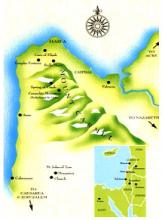 Origins & growth
Origins & growth
The Order of Carmelites has its origins on Mount Carmel, in Palestine, where, as we read in the first Book of Kings, the great prophet Elijah defended the true faith in the God of Israel, when he won the challenge against the priests of Baal. It was also on Mount Carmel that the same prophet, praying in solitude, saw the small cloud which brought life-giving rain after the long drought. From time immemorial, this mountain has been considered the lush garden of Palestine and symbol of fertility and beauty. Indeed, "Karmel" means "garden".
In the 12th century (perhaps after the third crusade, 1189-1191), some pilgrims who had come from Europe, came together near the "spring of Elijah", in one of the narrow valleys of Mount Carmel, to live out their Christianity as hermits after the example of the prophet Elijah in the very land of our Lord Jesus Christ. Then and in later times, the Carmelites did not acknowledge anyone in particular as their founder, but remained faithful followers of Elijah who was associated with Mount Carmel through biblical events and through Greek and Latin patristic tradition which saw in the prophet one of the founders of the monastic life. In the middle of the cells they built a chapel which they dedicated to Mary, Mother of Jesus, thus developing a sense of belonging to Our Lady as Patroness, and they became known by her name as "Brothers of Saint Mary of Mount Carmel". Thus Carmel is deeply associated with Elijah and Mary. From Elijah the Carmelites inherited a burning passion for the living and true God and the desire to make His Word intimately their own in order to witness to Its presence in the world; with Mary, the Mother of God, they are committed to live "in the footsteps of Jesus Christ" with the same intimate and deep feelings which were Mary's.
In order to have some juridical stability, this group of lay hermits turned to the Patriarch of Jerusalem, Albert Avogadro (1150-1214), who was then living at St John of Acre near Mount Carmel. Between 1206-1214, Albert wrote for them a formula of life. Successive approvals of this formula of life by various Popes helped the process of transforming the group into a Religious Order, a fact which took place at the time of the definitive approval of the text as a Rule by Innocent IV in 1247. Thus the Carmelite Order took its place alongside the Mendicant Orders.
However, about 1235, the Carmelites were forced to abandon their place of origin due to the incursions and persecutions of the Saracens who were reconquering the Holy Land from the crusaders. Most of them went back to their country of origin in Europe.
Soon they increased and flourished in the sciences and in holiness. Later some women attached themselves to the monasteries of the friars and in 1452 became cloistered nuns living in their own communities.
Reform & development
In the 15-16th centuries there was some relaxation of discipline in various communities, a fact greatly opposed by Priors General such as Blessed John Soreth (+1471), Nicholas Audet (+1562) and John Baptist Rossi (+1578), and by some reforms (among others those of Mantua and Monte Oliveti in Italy and of Albi in France) to put a stop to the spread of the abuses and the mitigations. The most famous reform is certainly the one started in Spain by St Teresa of Jesus for the reform of the nuns and then, helped by St John of the Cross and Fr Girolamo Gracian, for the reform of the friars. The most relevant aspect of this reform of Teresa is not so much that she opposed the mitigations introduced in the life of Carmel, but rather her ability to integrate in her project, vital and ecclesial elements of her time. In 1592 this reform, called that of the "Discalced Carmelites" or of the "Teresians", became independent from the Carmelite Order and grew rapidly in the congregations of Spain and Italy which were then united in 1875. Thus there are two Orders of Carmelites: "The Carmelites", also known as of the "Ancient Observance" or "Calced", and "The Discalced Carmelites" or "Teresians" who consider St Teresa of Jesus their reformer and foundress.
In spite of this division, during the following centuries the Carmelite Order continued its spiritual journey. Many illustrious men and women gave new spirit to Carmel with their own spirituality and genius. There was also significant development among the laity with the institution of the Carmelite Third Order and the Confraternities of the Scapular of Our Lady of Mt Carmel throughout the world. With the Reforms of Touraine in France, and of Monte Santo, Santa Maria della Vita, Piedmont, and Santa Maria della Scala in Italy, in the XVII and XVIII centuries the movement for a stricter observance spread everywhere.
At the dawn of the French Revolution, the Carmelite Order was established throughout the world with 54 Provinces and 13,000 religious. But as a result of the French Revolution the Order suffered great losses, such that at the end of the 19th century it was reduced to 8 Provinces and 727 religious. But it was this small band of religious who during the 20th century, with determination and courage, re-established the Order in places where it had been and also planted the Order on new continents.
The Carmelite Order today
Since the time of the Second Vatican Council (1962 - 1965), Carmelites have reflected at length on their identity, on their charism, on what is fundamental in their lives and what is for them a "life-project", namely "to live a life of allegiance to Jesus Christ and serve him faithfully with a pure heart and a good conscience" (Rule). They found their allegiance to Christ in their commitment to seek the face of the living God (contemplative dimension), in living in fraternity and service (diakonia) in the midst of the people. They see all this in the lives of the prophet Elijah and the Blessed Virgin Mary who were led by the Spirit of God. Looking at Mary and Elijah, it is easy for the Carmelites to understand, to interiorise, to live and to announce the truth that makes a person free.
Carmelites, conscious of being part of the Church and of history, live in a fraternity that is open to God and to people, able to listen and give an authentic response to the evangelical life according to their own charism, and they commit themselves to build the Kingdom of God wherever they are. Indeed they are committed to evangelisation in houses of prayer, centres for spiritual exercises, parishes, Marian sanctuaries, schools, religious associations; and to Justice and Peace wherever human dignity is trodden underfoot, especially among the poor, the marginalised, the suffering.
 To this vast and varied challenge of the Carmelite friars, one will find in close collaboration: communities of cloistered nuns, Congregations of sisters, Consecrated Lay people, numerous groups of Third Order Lay members and Confraternities of the Scapular of Our Lady of Mt. Carmel. All these groups, born of the Spirit throughout the centuries, and inspired by the Carmelite Rule are intimately united by the bond of love, of spirituality and of the communion of spiritual goods. They constitute the Carmelite Family in the Church. At present the Carmelite Order (the friars) is formed of Provinces, General Commissariats, General Delegations, Hermetical Communities and an Affiliated Community with a total of about 2,000 religious. They are found in all the continents.
To this vast and varied challenge of the Carmelite friars, one will find in close collaboration: communities of cloistered nuns, Congregations of sisters, Consecrated Lay people, numerous groups of Third Order Lay members and Confraternities of the Scapular of Our Lady of Mt. Carmel. All these groups, born of the Spirit throughout the centuries, and inspired by the Carmelite Rule are intimately united by the bond of love, of spirituality and of the communion of spiritual goods. They constitute the Carmelite Family in the Church. At present the Carmelite Order (the friars) is formed of Provinces, General Commissariats, General Delegations, Hermetical Communities and an Affiliated Community with a total of about 2,000 religious. They are found in all the continents.
Contact Us
Please click on the tabs below to scroll through our contact details.
Provincial Centre
Carmelite Provincial Office
75 Wright Street
Middle Park Vic 3206
Tel: +61 3 9699 1922
Email: This email address is being protected from spambots. You need JavaScript enabled to view it.
Prior Provincial
Father Bruce Clark, O.Carm.
Province Executive Assistant
Ms Belinda Ahearn
Business Manager
Mr Joe Konynenburg
About the Lay Carmelites
Since our beginnings in the 13th century, Carmelites have sought to follow Christ in a fraternal community united in a spirit of contemplative prayer and our desire to be of service to God and to the people among whom we live. The Lay Carmelites are just what the name implies: lay men and women who form an integral part of the Carmelite family and try to live out the Carmelite way of life in the ordinary circumstances of our family and social life.
Carmelite Rule
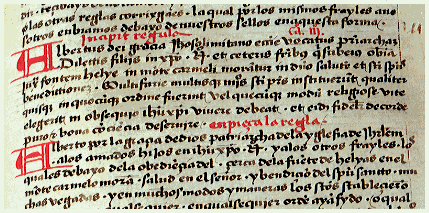 A rule of life was given to the early Carmelites by St Albert Avogadro, Patriach of Jerusalem between the years 1206 - 1214. It was finally approved by Pope Innocent in 1247 and later underwent mitigations which were not in the original text.
A rule of life was given to the early Carmelites by St Albert Avogadro, Patriach of Jerusalem between the years 1206 - 1214. It was finally approved by Pope Innocent in 1247 and later underwent mitigations which were not in the original text.
The Carmelite Rule states that is basic for a Carmelite to "live a life of allegiance to Jesus Christ - how, pure in heart and stout in conscience, he must be unswerving in the service of his Master" [no.2].
The Rule outlines the way to live out the Carmelite life in allegiance to Christ, according to the spirit of the Order. We are to ponder the law of the Lord, by day and by night, in silence and in solitude, so that the word of God may dwell abundantly in the hearts and on the lips of those who profess it. We are to pray with perseverance, especially by keeping vigil and praying the psalms. We are also to be clothed in spiritual armour; to live in fraternal communion, expressed through the daily celebration of the Eucharist, through fraternal meetings in chapters, through shared ownership of all material goods, through fraternal and loving correction of failings, and through a life of austerity, with work and penance, rooted in faith, hope and love, always conforming one’s own will to God’s, sought in faith through dialogue and through the prior’s service to his brothers. (Carmelite Constitutions n.11)
To live a life of allegiance to Jesus Christ, the Carmelites bind themselves especially to:
- develop the contemplative dimension of their life, in an open dialogue with God
- live as brothers, full of charity
- meditate day and night on the Word of the Lord
- pray together or alone several times a day
- celebrate the Eucharist every day
- do manual work, as Paul the Apostle did
- purify themselves of every trace of evil
- live in poverty, placing in common what little they may have
- love the Church and all people
- conform their will to that of God, seeking the will of God in faith, in dialogue and through discernment.
The Carmelite Rule is the shortest of all known Rules, almost exclusively made up of biblical precepts. To this day it is a rich source of inspiration for life.
TEXT OF THE CARMELITE RULE
[1]
Albert, called by God's favour to be Patriarch of the Church of Jerusalem, bids health in the Lord and the blessing of the Holy Spirit to his beloved sons in Christ, B. and the other hermits under obedience to him, who live near the spring on Mount Carmel.
[2]
Many and varied are the ways in which our saintly forefathers laid down how everyone, whatever his station or the kind of religious observance he has chosen, should live a life of allegiance to Jesus Christ - how, pure in heart and stout in conscience, he must be unswerving in the service of his Master.
[3]
It is to me, however, that you have come for a rule of life in keeping with your avowed purpose, a rule you may hold fast to henceforward; and therefore:
[4]
The first thing I require is for you to have a Prior, one of yourselves, who is to be chosen for the office by common consent, or that of the greater and maturer part of you. Each of the others must promise him obedience - of which, once promised, he must try to make his deed the true reflection - and also chastity and the renunciation of ownership.
[5]
If the Prior and the brothers see fit, you may have foundations in solitary places, or where you are given a site suitable and convenient for the observance proper to your Order.
[6]
Next, each one of you is to have a separate cell, situated as the lie of the land you propose to occupy may dictate, and allotted by disposition of the Prior with the agreement of the other brothers, or the more mature among them.
[7]
However, you are to eat whatever may have been given you in a common refectory, listening together meanwhile to a reading from Holy Scripture where that can be done without difficulty.
[8]
None of the brothers is to occupy a cell other than that allotted to him, or to exchange cells with another, without leave or whoever is Prior at the time.
[9]
The Prior's cell should stand near the entrance to your property, so that he may be the first to meet those who approach, and whatever has to be done in consequence may all be carried out as he may decide and order.
[10]
Each one of you is to stay in his own cell or nearby, pondering the Lord's law day and night and keeping watch at his prayers unless attending to some other duty.
[11]
Those who know how to say the canonical hours with those in orders should do so, in the way those holy forefathers of ours laid down, and according to the Church's approved custom. Those who do not know the hours must say twenty-five 'Our Fathers' for the night office, except on Sundays and solemnities when that number is to be doubled so that the 'Our Father' is said fifty times; the same prayer must be said seven times in the morning in place of Lauds, and seven times too for each of the other hours, except for Vespers when it must be said fifteen times.
[12]
None of the brothers must lay claim to anything as his own, but you are to possess everything in common; and each is to receive from the Prior - that is from the brother he appoints for the purpose - whatever befits his age and needs.
[13]
You may have as many asses and mules as you need, however, and may keep a certain amount of livestock or poultry.
[14]
An oratory should be built as conveniently as possible among the cells, where, if it can be done without difficulty, you are to gather each morning to hear Mass.
[15]
On Sundays too, or other days if necessary, you should discuss matters of discipline and your spiritual welfare; and on this occasion the indiscretions and failings of the brothers, if any be found at fault, should be lovingly corrected.
[16]
You are to fast every day, except Sundays, from the feast of the Exaltation of the Holy Cross until Easter Day, unless bodily sickness or feebleness, or some other good reason, demand a dispensation from the fast; for necessity overrides every law.
[17]
You are to abstain from meat, except as a remedy for sickness or feebleness. But as, when you are on a journey, you more often than not have to beg your way, outside your own houses you may eat foodstuffs that have been cooked with meat, so as to avoid giving trouble to your hosts. At sea, however, meat may be eaten.
[18]
Since man's life on earth is a time of trial, and all who would live devotedly in Christ must undergo persecution, and the devil your foe is on the prowl like a roaring lion looking for prey to devour, you must use every care to clothe yourselves in God's armour so that you may be ready to withstand the enemy's ambush.
[19]
Your loins are to be girt with chastity, your breast fortified by holy meditations, for as Scripture has it, holy meditation will save you. Put on holiness as your breastplate, and it will enable you to love the Lord your God with all your heart and soul and strength, and your neighbour as yourself. Faith must be your shield on all occasions, and with it you will be able to quench all the flaming missiles of the wicked one: there can be no pleasing God without faith; and the victory lies in this - your faith. On your head set the helmet of salvation, and so be sure of deliverance by our only Saviour, who sets his own free from their sins. The sword of the spirit, the word of God, must abound in your mouths and hearts. Let all you do have the Lord's word for accompaniment.
[20]
You must give yourselves to work of some kind, so that the devil may always find you busy; no idleness on your part must give him a chance to pierce the defences of your souls. In this respect you have both the teaching and the example of Saint Paul the Apostle, into whose mouth Christ put his own words. God made him preacher and teacher of faith and truth to the nations: with him as your leader you cannot go astray. We lived among you, he said, labouring and wary, toiling night and day so as not to be a burden to any of you; not because we had no power to do otherwise but so as to give you, in your own selves, an example you might imitate. For the charge we gave you when we were with you was this: that whoever is not willing to work should not be allowed to eat either. For we have heard that there are certain restless idlers among you. We charge people of this kind, and implore them in the name of our Lord Jesus Christ, that they earn their own bread by silent toil. This is the way of holiness and goodness: see that you follow it.
[21]
The Apostle would have us keep silence, for in silence he tells us to work. As the Prophet also makes known to us: Silence is the way to foster holiness. Elsewhere he says: Your strength will lie in silence and hope. For this reason I lay down that you are to keep silence from after Compline until after Prime the next day. At other times, although you need not keep silence so strictly, be careful not to indulge in a great deal of talk, for as Scripture has it - and experience teaches us no less - sin will not be wanting where there is much talk, and he who is careless in speech will come to harm; and elsewhere: The use of many words brings harm to the speaker's soul. And our Lord says in the Gospel: Every rash word uttered will have to be accounted for on judgement day. Make a balance then, each of you, to weigh his words in; keep a tight rein on your mouths, lest you should stumble and fall in speech, and your fall be irreparable and prove mortal. Like the Prophet, watch your step lest your tongue give offence, and employ every care in keeping silent, which is the way to foster holiness.
[22]
You, brother B., and whoever may succeed you as Prior, must always keep in mind and put into practice what our Lord said in the Gospel: Whoever has a mind to become a leader among you must make yourself servant to the rest, and whichever of you would be first must become your bondsman.
[23]
You other brothers too, hold your Prior in humble reverence, your minds not on him but on Christ who has placed him over you, and who, to those who rule the Churches, addressed these words: Whoever pays you heed pays heed to me, and whoever treats you with dishonour dishonours me; if you remain so minded you will not be found guilty of contempt, but will merit life eternal as fit reward for your obedience.
[24]
Here then are the few points I have written down to provide you with a standard of conduct to live up to; but our Lord, at his second coming will reward anyone who does more than he is obliged to do. See that the bounds of common sense are not exceeded, however, for common sense is the guide of the virtues.
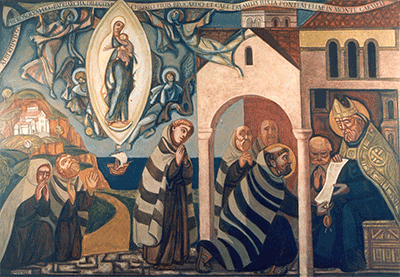
Carmelite Charism
A charism is a gift from God to the Church for the world. With regard to a Religious Order, the term refers to the gift which God gives to an individual or group to inspire the founding of a new religious family within the Church. This gift is handed down through the centuries and enriched by all who are called to live it. The charism of each religious family is the particular way in which its members are called to follow Christ. Since all Christians follow Christ, the charisms will have many elements in common, but the way in which these elements are emphasised gives each religious group its unique feel. All religious families have been asked by the Church to rediscover their original founding charism and make it come alive in each culture and in every age.
The charism of the Carmelite Order is God's gift given originally to those nameless hermits who gathered together on Mount Carmel, beside the well of Elijah, at the end of the 12th and beginning of the 13th centuries. The Carmelite Order has no known founder but sprang from the desire of those first hermits to follow Christ together with a pure heart and a good conscience. They asked the Patriarch of Jerusalem, St Albert, to write for them a rule of life (c.1206-1214) which laid down certain guidelines based on the previous way of life of the hermits.
This Rule of St Albert and the experience of the Carmelites as they sought to be faithful to it in various circumstances gave definitive shape to the charism. We can say that there are several elements which make up the Carmelite charism. Firstly, and most importantly, it is a way of following Christ with total dedication. Carmelites do this by seeking to form contemplative communities at the service of God's people in whose midst they live. Fraternity, service and contemplation are therefore essential values for all Carmelites.
Fraternity
Carmelites seek to form communities where each person feels accepted and valued not for what he can do but simply because he is. This kind of community is in itself a witness that the love of Christ can break down the barriers which human beings set up and that it is possible for people of different backgrounds and nationalities to live together in peace and harmony. Carmelites are also aware of being part of an international fraternity which is present in many parts of the world.
Service
The hermits were forced to leave their home on Mount Carmel and settle in Europe. There they changed their style of life from hermits to friars. The major difference is that friars are called to serve the People of God in some active apostolate. Some Religious Congregations were founded for a specific work but the Carmelite Order tries simply to respond to the needs of the Church and the world which differ according to time and place, and so, many friars work in parishes, schools, universities, retreat centres, prisons, hospitals etc. The kind of service which each individual friar is involved in will depend on the needs of the people in whose midst he lives and his own particular talents.
Contemplation
The heart of the Carmelite charism is prayer and contemplation. The quality of our prayer determines the quality of the community life and the quality of the service which is offered to others. The goal of the Carmelite life is union with God. We seek to live in God's presence and consent to God's will for us. This involves us in listening to God who speaks to us in many ways and especially in the words of Scripture. Prayer is the way we relate to God and as we grow in friendship with Christ our prayer will tend to become more and more simple. The relationship with Christ will change us, impelling us to move out of the prison of selfishness towards the bright daylight of pure love for God and our fellow men and women. We are called to embark on a journey of faith whereby we are gradually stripped of all that is not God so that we can put on Christ. We do all we can to respond to God's initiative in calling us but we are very aware that in the end only God can change our hearts and so we learn to wait patiently for the coming of God to us. As we follow Christ along this path of trust in God we are inspired by the example and virtues of Mary, the mother of Jesus, and the Prophet Elijah.
Prayer and contemplation for the Carmelite are not private matters between the individual and God but are to be shared with others since the charism is given for the whole world. Therefore there is an emphasis in the Order on the ministry of teaching prayer and giving spiritual direction. The Carmelite is aware that the transformation of the human heart by God may be hidden from most eyes but has far reaching consequences for our world. The way of prayer is mysterious and goes beyond our normal human categories. Prayer opens us to the Ultimate Mystery.
Mary and Elijah
As we attempt to follow Christ more closely, we Carmelites find inspiration in the Old Testament Prophet, Elijah, and in the Blessed Virgin Mary.
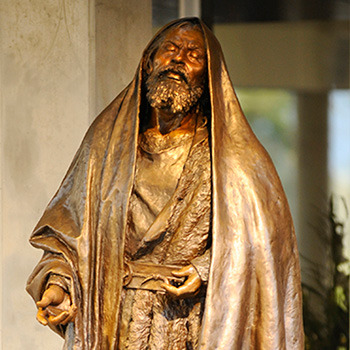 The Prophet Elijah
The Prophet Elijah
Elijah's memory was kept alive especially on Mount Carmel where he challenged the people to stop hobbling first on one foot and then on the other but to choose who is God in Israel - Yahweh or Baal. According to the story, which can be found in the First Book of Kings, chapter 18, Elijah's sacrifice was consumed by fire from heaven which proved to the people that Yahweh was the true God.
Elijah in the presence of the Lord on Mount Horeb
Elijah made himself available for God's work and was sent into various situations to proclaim God's word. Elijah undertook a long journey through the desert where he began to despair. He sat down under a bush and wished he were dead but God would not allow him to die and prodded him to continue his journey to Mount Horeb. When he arrived there, God became present to Elijah. God came not with the signs usual in the Old Testament of fire, earthquake and mighty wind but in the sound of a gentle breeze. Elijah was sent back to his people to carry out God's will.
From Elijah, Carmelites learn to listen for the voice of God in the unexpected and in silence. We seek to allow the Word of God to shape our minds and our hearts so that the way we live and the things we do may be prophetic and therefore faithful to the memory of our father Elijah.
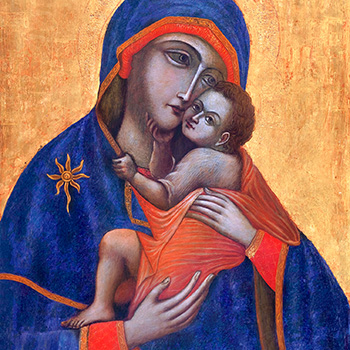 The Blessed Virgin Mary
The Blessed Virgin Mary
The first hermits on Mount Carmel built a church in the middle of their cells. This was the centre of their lives where they converged each day to celebrate Mass together. This little church they named in honour of Our Lady. By this fact the first group of Carmelites took her as their patroness, promising her their faithful service and expecting her protection and favour. They were proud to bear the title of "Brothers of the Blessed Virgin Mary of Mount Carmel" and they defended this title with vigour when their right to it was challenged.
Mary ever ready to accomplish the wish of God
Mary consented to God's will when she was asked to be the mother of the Saviour. She pondered on the events of her life and was able to see in them the hand of God at work. Mary did not become proud about her unique vocation but instead praised God for looking on her lowliness and doing great things in her. She was with Jesus at the beginning of his public ministry when, at the marriage feast at Cana, she made known to him the simple need, "They have no wine". She was with him as he died and there she became the mother of all believers. At the beginning of the Acts of the Apostles we find Mary gathered in the upper room praying with the other disciples waiting for the outpouring of the Holy Spirit. For us Carmelites, Mary is a constant presence in our lives, guiding us and protecting us as we seek to follow Christ.
The brown scapular has for many centuries summed up the Carmelite's relationship with Our Lady. The scapular is a piece of cloth based on the traditional Carmelite friar's garb. Wearing the scapular is a sign of consecration to Mary, the Mother of God, and is a symbol showing that the person is putting on the virtues of Mary and is being protected by her.
Mary symbolises for the Carmelite everything that we hope for - to enter into an intimate relationship with Christ, being totally open to God's will and having our lives transformed by the Word of God. Carmelites have always thought of Mary as the Patroness of the Order. We seek to live in spiritual intimacy with her so that we can learn from her how to live as God's children.
Elijah and Mary are inspirational figures for all Carmelites. They play a very important part in the life and spirituality of the Order which sees itself as belonging to Mary and looks to Elijah as our spiritual father.
Prayers for Discernment
Lord Christ,
you have no body on earth but ours,
no hands but ours,
no feet but ours.
Our are the eyes through which your compassion
must look out on the world.
Ours are the feet by which you may still
go about doing good.
Ours are the hands with which
you bless people now.
Bless our minds and bodies,
that we may be a blessing to others.St Teresa of Avila - Carmelite
***********************
O Lord God,
I have no idea where I am going,
I do not see the road ahead of me,
I cannot know for certain where it will end.Nor do I really know myself,
and that fact that I think
I am following Your will
Does not mean that I am actually doing so.
But I believe
that the desire to please You
does in fact please You.
And I hope I have that desire in all that I am doing.I hope that I ill never do anything
apart from that desire to please You.
And I know that if I do this
You will lead me by the right road,
though I may nothing about it.
Therefore I will trust You always
though I may seem to be lost and in the shadow of death,
I will not fear,
for You are with me
and You will never leave me to make the journey alone.Thomas Merton - Cistercian
************************
O God, you have created us (me)
to do some definite service;
you have given some definite work to us (me)
which you have not given to any other.
We (I) a place in your plan.
We may never know what it is in this life
but we shall be told it in the next.
Therefore we (I) will trust you in all things.
If we are sick, our sickness may serve you.
If we are worried, our worry may serve you.
If we are in sorrow, our sorrow may serve you.
Nothing is in vain:
all things serve your purpose.
We may lose our friends and find ourselves among strangers;
we may feel forgotten so that our spirits may sink;
our future may be hidden from us;
still, you work in all things for good,
and we (I) trust you.Cardinal John Henry Newman
For further information please contact Carmelite Vocations.
Making a Decision
It can be difficult at times to know exactly how to go about making a decision.
Here are some simple steps to guide your decision-making.
Begin by acknowledging who I am before God at this point in my life.
At the start of this time I present myself before God with empty hands.
- Clearly define the choices that lie before you.
- Make a list of the pros and cons of each choice.
- Take some quiet time and pray with this list.
- What motives are drawing you to choose one choice over another?
- Are these motives in line with you value system?
- Are you now experiencing peace with the choice you made?
- If not, share your experience with a trusted friend and ask some input.
- Take some additional time to pray asking the Spirit for guidance.
- When the right decision comes, peace and joy can be signs that the choice is right for you
For further information please contact Carmelite Vocations.














 Then there's Gloria, who showed courage and initiative in asking The Carmelites for help.
Then there's Gloria, who showed courage and initiative in asking The Carmelites for help.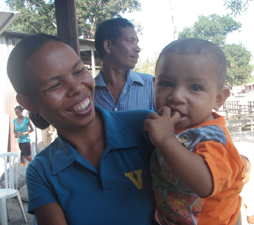 Lucinda is too ill to look after Louis, her 18 month old son. She has asked the Carmelites to find a family who will care for him. She hopes her son never experiences poverty. In order to grow up well, Louis will need lots of love, nutritious food, safe drinking water, vaccines to help build up his immune system and an education so he can eventually find work. For the next 18 years Louis will depend on caring people like you to help him grow up and break free from poverty.
Lucinda is too ill to look after Louis, her 18 month old son. She has asked the Carmelites to find a family who will care for him. She hopes her son never experiences poverty. In order to grow up well, Louis will need lots of love, nutritious food, safe drinking water, vaccines to help build up his immune system and an education so he can eventually find work. For the next 18 years Louis will depend on caring people like you to help him grow up and break free from poverty.
